-
Japan
Unemployment problems? I’m not sure…
Kamiya Akinori(22), a senior in the department of global Japanese studies at Meiji University, is already employed at Mitsubishi Steel, the original conglomerate of Japan, in last August. Kamiya, who had done 15 interviews for the employment, said “I didn’t hear of the employment crisis that much” and “Few of my friends have difficulty finding jobs.”
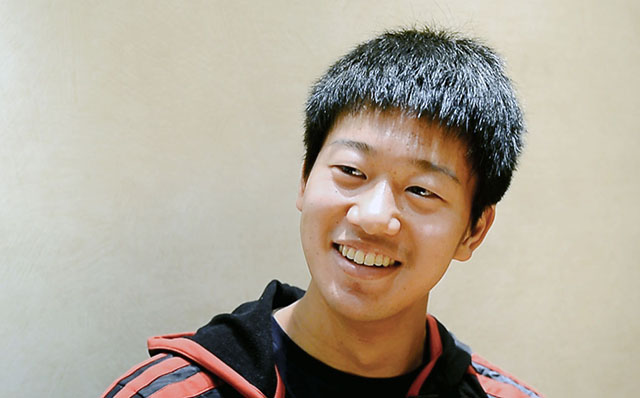 According to the data announced by the Ministry of Health, Labor and Welfare at the beginning of 2015, the employment rate of college graduates was 96.7%. A series of related articles were published in Korea as well. Although there might be an error in
the statistics, all young men who I met in Tokyo also agreed that “Finding a job is not difficult at all”.
According to the data announced by the Ministry of Health, Labor and Welfare at the beginning of 2015, the employment rate of college graduates was 96.7%. A series of related articles were published in Korea as well. Although there might be an error in
the statistics, all young men who I met in Tokyo also agreed that “Finding a job is not difficult at all”.
 Ah-In Lee(24), a Korean who came to Japan in 2011 for studying, decided to find employment in Japan instead of coming back home after graduating the department of International Studies at Takushoku University in March, 2015. Miss Lee told that friends
in Korea were saying only ‘You cannot get employed even though you applied for 100 companies’ or ‘The working condition is so poor’, adding “It is not hard to get a job in Japan as long as you do not stick to large conglomerates”.
Also, she said “My friends who were in the same band club at the university were employed rather earlier than others although they skipped the class often and didn’t study hard” and “I thought it was surprising that even students
like them could find jobs in Japan”. It is possible in Japan because the GPA is not required for writing a resume.
Ah-In Lee(24), a Korean who came to Japan in 2011 for studying, decided to find employment in Japan instead of coming back home after graduating the department of International Studies at Takushoku University in March, 2015. Miss Lee told that friends
in Korea were saying only ‘You cannot get employed even though you applied for 100 companies’ or ‘The working condition is so poor’, adding “It is not hard to get a job in Japan as long as you do not stick to large conglomerates”.
Also, she said “My friends who were in the same band club at the university were employed rather earlier than others although they skipped the class often and didn’t study hard” and “I thought it was surprising that even students
like them could find jobs in Japan”. It is possible in Japan because the GPA is not required for writing a resume.

The qualification doesn’t matter
The resume of Shouji Yuri(22), a senior student in the department of International Studies at Takushoku University, was unique. Shouji’s resume for a wedding service company was handwritten, even with her own drawings and pictures which she cut and pasted on the paper. The requirement of the company was to ‘make a wedding plan utilizing your personality’. Shouji said “I illustrated the customized wedding service including a wedding dress, make-up, the concept of wedding ceremony, and even honeymoon based on personalities of my best friends.” The result of the employment in Japan depends on the personality and creativity. Shouji was asked a question, for example, ‘Express yourself on the white paper’ at a job interview. She confessed that she did not know how to answer the abstract question. Saka Aiko(22), a senior at Hirosaki University in Aomori Prefecture, who came to Tokyo for an interview, also recalled the memory when she was embarrassed for the question asking “If your boss orders you to go to Mars, what would you bring?”.
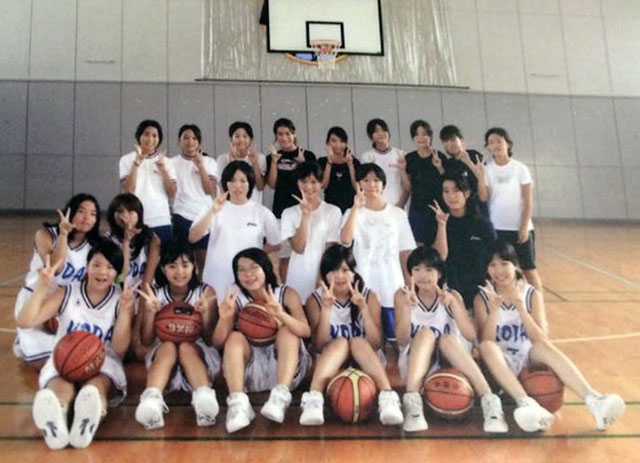 Since there is no right path to get a job, students tend to invest their time to enjoy the campus life more than to prepare employment. Both Kamiya and Shouji have played a long time in a basketball team. Shouji, who has been in
a basketball team for 7 years, held the post of captain. Kamiya said “I tried my best to enjoy what I could afford during school years which I cannot do after getting a job”, adding “I didn’t put extra efforts to find a job”.
Another thing that ties up Japanese college students is the ‘lump employment of prospective graduates’ system that companies hire students who are in junior or senior years. It strictly limits reapplications. Saka claimed “If you
cannot be employed during the lump employment periods, it is hard to enter the company that you want” and “Due to the burden to get a job during this season, I become more anxious as time flows”.
Since there is no right path to get a job, students tend to invest their time to enjoy the campus life more than to prepare employment. Both Kamiya and Shouji have played a long time in a basketball team. Shouji, who has been in
a basketball team for 7 years, held the post of captain. Kamiya said “I tried my best to enjoy what I could afford during school years which I cannot do after getting a job”, adding “I didn’t put extra efforts to find a job”.
Another thing that ties up Japanese college students is the ‘lump employment of prospective graduates’ system that companies hire students who are in junior or senior years. It strictly limits reapplications. Saka claimed “If you
cannot be employed during the lump employment periods, it is hard to enter the company that you want” and “Due to the burden to get a job during this season, I become more anxious as time flows”.
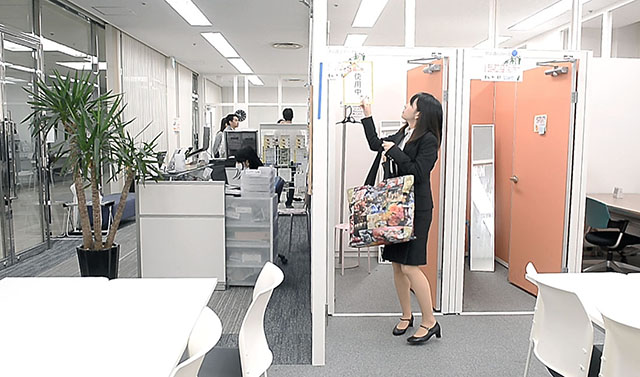
Temporary positions are okay as long as they are not for black companies …
What Japanese college students worry about is not the employment itself, but the life after getting a job. In Japan, a black company, referring the company where forces employees into doing severe working, is heavily criticized. In 2009, even the film titled ‘I am working at a black company, but I might reach the limit now’ was released.
 Shouji paid the most attention to searching information on black companies via online and by books while looking for a job. The first thing he did after being employed at a hotel was to check the information website about company reputations.
The reason why Naka Yosuke(26), who I met at Ikebukuro, decided to live the lifestyle of NEET (Not in Education, Employment or Training) was that he was not confident to follow his friends’ decisions to work late and earn little.
He is working at ‘NEET Co. Ltd’ where carries out business projects with other NEET people. Naka said “Many colleagues at my company are those who could not stand the poor working conditions including low salary or working overtime,
and wanted to find a new job”.
Shouji paid the most attention to searching information on black companies via online and by books while looking for a job. The first thing he did after being employed at a hotel was to check the information website about company reputations.
The reason why Naka Yosuke(26), who I met at Ikebukuro, decided to live the lifestyle of NEET (Not in Education, Employment or Training) was that he was not confident to follow his friends’ decisions to work late and earn little.
He is working at ‘NEET Co. Ltd’ where carries out business projects with other NEET people. Naka said “Many colleagues at my company are those who could not stand the poor working conditions including low salary or working overtime,
and wanted to find a new job”.
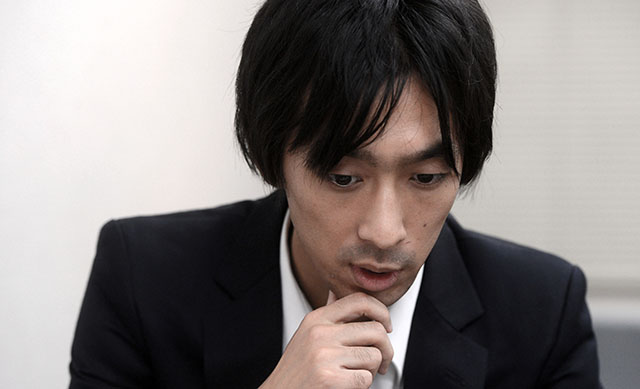 As long as it is not a black company, they do not have repulsion toward temporary positions. They do not experience unfair treatment or social discrimination. Ah-In Lee is now finding a new job since her contract was cancelled when
her previous company, in which she entered after graduation, was merged. Miss Lee said “I had an interview for a temporary position yesterday, but there is no difference in the annual salary and incentives compared to the regular
workers” and added “There is even a system that offers $8,500 when the contract is up to support temporary workers in building a career”.
When Kamiya and Shouji heard the employment situation in Korea, they unanimously claimed, as if they planned ahead, “It seems that Koreans are obsessed with entering large companies to live a secure life and highly conscious of the
way how other people are looking at them” and “Since entering a small and medium sized company causes no problem in one’s life in Japan and everyone shares the same idea, we do not need to be aware of people around us”.
As long as it is not a black company, they do not have repulsion toward temporary positions. They do not experience unfair treatment or social discrimination. Ah-In Lee is now finding a new job since her contract was cancelled when
her previous company, in which she entered after graduation, was merged. Miss Lee said “I had an interview for a temporary position yesterday, but there is no difference in the annual salary and incentives compared to the regular
workers” and added “There is even a system that offers $8,500 when the contract is up to support temporary workers in building a career”.
When Kamiya and Shouji heard the employment situation in Korea, they unanimously claimed, as if they planned ahead, “It seems that Koreans are obsessed with entering large companies to live a secure life and highly conscious of the
way how other people are looking at them” and “Since entering a small and medium sized company causes no problem in one’s life in Japan and everyone shares the same idea, we do not need to be aware of people around us”.
 Are young generations in Japan stuck in a rut of low-salary working? The annual salary of Shouji was about $20,600 (not very high), while Ah-In Lee was paid $23,140 including incentives (at a small company with 9 employees in total).
Although the transportation expenses and house price are expensive, since most companies support transportation expenses, the living condition is never too bad compared to Seoul if the house price could be saved by living in a
share house. One Korean employee working in Tokyo said “When taking everything in consideration, the quality of life is not lower than Seoul although you are employed at the small and medium sized company”.
Are young generations in Japan stuck in a rut of low-salary working? The annual salary of Shouji was about $20,600 (not very high), while Ah-In Lee was paid $23,140 including incentives (at a small company with 9 employees in total).
Although the transportation expenses and house price are expensive, since most companies support transportation expenses, the living condition is never too bad compared to Seoul if the house price could be saved by living in a
share house. One Korean employee working in Tokyo said “When taking everything in consideration, the quality of life is not lower than Seoul although you are employed at the small and medium sized company”.
☞Go to the menu -
Korea
The definition of a 26-year old man
‘Large company, small and medium sized company or a job seeker’
“When I finished my undergraduate studies, I thought that I could be a proud son of my parents if I enter Samsung. Currently, while I’m studying at the graduate school, I want to confess my father that ‘I do not want to work at Samsung, but rather at another company where would give me a salary at a certain amount. Although the name of the company is not Samsung, I think I can enjoy my work’. It is, however, difficult to say so realistically. Eventually, there’s nothing I can say but I would make him to boast about me by entering the recognized large company. I have no idea who has made the society like this, but this is the reality of Korea.”
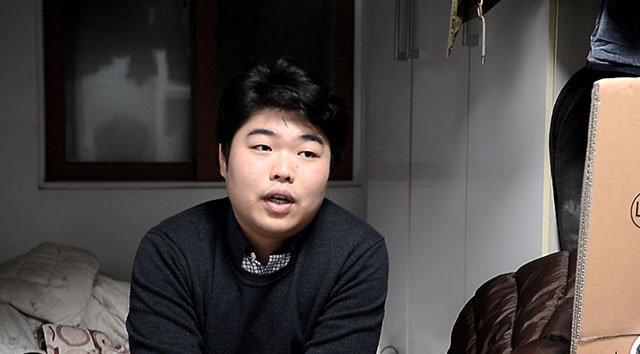 Byung-Woo Kang (27), who is attending a graduate school of the prestigious private University in Seoul, said “You can divide 26-year old men in Korea into two categories, those who entered large companies and who entered small and
medium sized companies” and “There would be no one who did not hear indirect pressure from parents saying ‘I heard a son of my friend entered a large company’ while preparing the employment.”
Mr. Kang graduated the department of electronic engineering at the local national University. At that time, he wanted to get a job first. Rather than emphasizing his major, he indiscriminately applied for 20 companies of the architecture,
oil, chemistry, pharmaceuticals, and others. He was accepted by a company, but he decided to give up on getting a job and enter the graduate school. He confessed that it was because he could not confidently answer the question
at the interview asking whether he could do his best. He thought that studying his major in depth at the graduate school would help him in finding answers in specific about what he really wants to do and can do well.
Byung-Woo Kang (27), who is attending a graduate school of the prestigious private University in Seoul, said “You can divide 26-year old men in Korea into two categories, those who entered large companies and who entered small and
medium sized companies” and “There would be no one who did not hear indirect pressure from parents saying ‘I heard a son of my friend entered a large company’ while preparing the employment.”
Mr. Kang graduated the department of electronic engineering at the local national University. At that time, he wanted to get a job first. Rather than emphasizing his major, he indiscriminately applied for 20 companies of the architecture,
oil, chemistry, pharmaceuticals, and others. He was accepted by a company, but he decided to give up on getting a job and enter the graduate school. He confessed that it was because he could not confidently answer the question
at the interview asking whether he could do his best. He thought that studying his major in depth at the graduate school would help him in finding answers in specific about what he really wants to do and can do well.
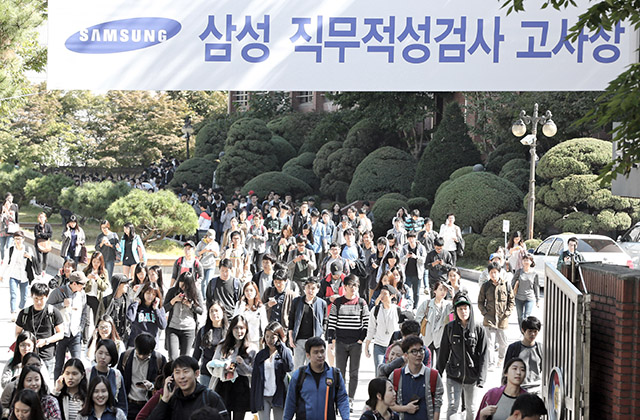 Now, half a year ahead to finish his master’s degree, his goal has changed. The fact that he is targeting a large company on the surface is unchanged, but it is not same as two years ago when he blindly pursued ‘Samsung’. “The goal
to enter Samsung when graduating the college was not mine, but rather made by the society, parents, and friends” said Mr. Kang, adding “Now I can build a plan in specific what kind of works I can enjoy at a company.”
Although the employment condition in Korea is not good enough for those who have master’s degrees to choose the company where they want to go, he is now strong and firm with a clear goal. He said “I am still anxious because there
is no difference between bachelor and master’s degrees for getting a job. Now, however, I have my own target which is not based on other’s criteria. So I am trying hard to develop power to overcome fears for failures”.
Recently Mr. Kang has buried himself in the lab for more than 10 hours a day to conduct a research project. When he is on the phone with his friends who are working at a company, they talk about their tough lives as if they are in
a competition for who stayed longer at the office or the lab. Can we expect hope or happiness in this life? Mr. Kang said “For the score of happiness in work and money, I could give merely 49 out of 100” because he doesn’t believe
he could earn a lot if he works less tomorrow than today. However, he didn’t erase a hope from his mind.
Now, half a year ahead to finish his master’s degree, his goal has changed. The fact that he is targeting a large company on the surface is unchanged, but it is not same as two years ago when he blindly pursued ‘Samsung’. “The goal
to enter Samsung when graduating the college was not mine, but rather made by the society, parents, and friends” said Mr. Kang, adding “Now I can build a plan in specific what kind of works I can enjoy at a company.”
Although the employment condition in Korea is not good enough for those who have master’s degrees to choose the company where they want to go, he is now strong and firm with a clear goal. He said “I am still anxious because there
is no difference between bachelor and master’s degrees for getting a job. Now, however, I have my own target which is not based on other’s criteria. So I am trying hard to develop power to overcome fears for failures”.
Recently Mr. Kang has buried himself in the lab for more than 10 hours a day to conduct a research project. When he is on the phone with his friends who are working at a company, they talk about their tough lives as if they are in
a competition for who stayed longer at the office or the lab. Can we expect hope or happiness in this life? Mr. Kang said “For the score of happiness in work and money, I could give merely 49 out of 100” because he doesn’t believe
he could earn a lot if he works less tomorrow than today. However, he didn’t erase a hope from his mind.
 “I once went abroad for language training and launched my own business as a means of an escape. Also, I put off my graduation before. Actually entering the graduate school was also a choice to escape from the reality. In the end,
however, there was nowhere I could make my getaway. ‘Escaping Joseon’ cannot be the answer I think. Some might say ‘You are born with a high-class spoon’ if I tell this, but that’s not true. I found two ways to live a happy life.
First, the hell will be opened as soon as you start comparing yourself to others, and second, if you cannot avoid your job, you should enjoy it. How can I find fun in working? Therefore I continuously keep reiterating the goal
of my life”.
“I once went abroad for language training and launched my own business as a means of an escape. Also, I put off my graduation before. Actually entering the graduate school was also a choice to escape from the reality. In the end,
however, there was nowhere I could make my getaway. ‘Escaping Joseon’ cannot be the answer I think. Some might say ‘You are born with a high-class spoon’ if I tell this, but that’s not true. I found two ways to live a happy life.
First, the hell will be opened as soon as you start comparing yourself to others, and second, if you cannot avoid your job, you should enjoy it. How can I find fun in working? Therefore I continuously keep reiterating the goal
of my life”.
“Gloomy for being no.100 in sports, but happy for being no.10000 in studying”
Jae-Yong Hwang (27), living in Sadang-dong, Seoul, is of the same age with Byung-Woo Kang but the circumstances were quite different. Mr. Hwang, whose highest level of education is high school, is actually out of work, merely making money only for cigarettes by part-time jobs. However, he was once also a passionate student majoring in sociology who even participated in a student movement at the university.
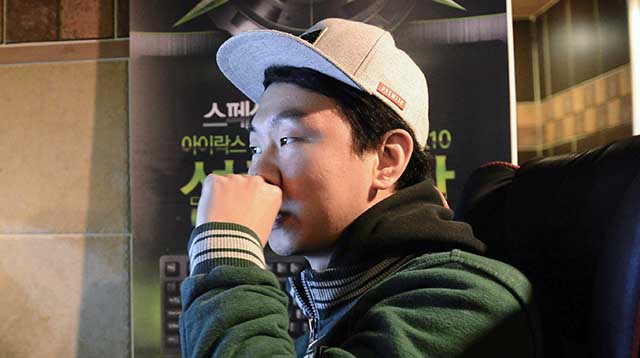 Mr. Hwang, from Sabuk-eup, Jeongsun-gun, of Gangwon province, decided to take a school qualification exam when he was a second year in middle school. In his hometown, pawnshops replaced supermarkets and stationery stores, and the
alleys changed into a motel complex. If the situation had come this far, he thought that it was not an appropriate place for a person to live in. Gangwon Land, the casino opened in 2000, has brought all these changes.
Unexpectedly, it was easy to persuade his dad. Mr. Hwang’s father who was a marathon runner always said ‘The future is gloomy for a sportsman even being ranked at 100 all over the country, but it is rosy if you are in top 10,000
for studying’. So he didn’t stop me from studying.
Then he came to Seoul in 2004. As money saved by delivering newspapers in his hometown was drained and funding from parents was cut sometimes because of the difficult household situation, he had suffered from hardships of life which
was unbearable for a mere 17-year old boy. He once survived a day only with two triangular Gimbaps which were just before expiration dates and an instant cup noodle, and when the manager knocked his door at Goshiwon (the accommodation
for examiners in Korea), he held his breath in a deadly silence. Mr. Hwang confessed “I experienced the feeling of severe helplessness at that time”.
After many twists and turns, he could enter the department of sociology at a four-year-course university in the capital area. Trauma for being helpless, however, came back at a senior year at the university. Mr. Hwang, who was under
mounting pressures including the household situation after finishing his military service and college tuition, looked back on the past saying “One day, there was nothing I could do but abandon everything around me”.
Mr. Hwang, from Sabuk-eup, Jeongsun-gun, of Gangwon province, decided to take a school qualification exam when he was a second year in middle school. In his hometown, pawnshops replaced supermarkets and stationery stores, and the
alleys changed into a motel complex. If the situation had come this far, he thought that it was not an appropriate place for a person to live in. Gangwon Land, the casino opened in 2000, has brought all these changes.
Unexpectedly, it was easy to persuade his dad. Mr. Hwang’s father who was a marathon runner always said ‘The future is gloomy for a sportsman even being ranked at 100 all over the country, but it is rosy if you are in top 10,000
for studying’. So he didn’t stop me from studying.
Then he came to Seoul in 2004. As money saved by delivering newspapers in his hometown was drained and funding from parents was cut sometimes because of the difficult household situation, he had suffered from hardships of life which
was unbearable for a mere 17-year old boy. He once survived a day only with two triangular Gimbaps which were just before expiration dates and an instant cup noodle, and when the manager knocked his door at Goshiwon (the accommodation
for examiners in Korea), he held his breath in a deadly silence. Mr. Hwang confessed “I experienced the feeling of severe helplessness at that time”.
After many twists and turns, he could enter the department of sociology at a four-year-course university in the capital area. Trauma for being helpless, however, came back at a senior year at the university. Mr. Hwang, who was under
mounting pressures including the household situation after finishing his military service and college tuition, looked back on the past saying “One day, there was nothing I could do but abandon everything around me”.
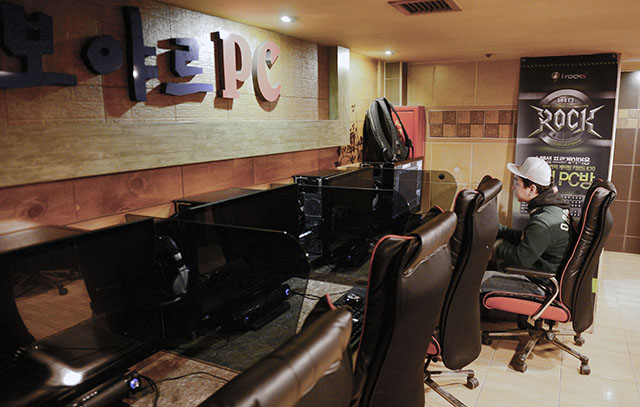 The result was disenrollment. Although he agreed that it was because of his ‘fragile willpower’, he said he also wondered how it would be if he was born with a ‘gold spoon’, or regardless of money, if he was encouraged from his child
hood and could learn the attitude to the life to rise from the failures.
Mr. Hwang shares the idea how to find happiness in ‘Hell-Joseon’ in which has ‘No-answer’ with Byung-Woo Kang. “I was impressed by the lecture of Alain de Botton on TED, especially by his message saying ‘although it is fearful to
face failures, the worst is to get the unwanted result at the end. So you should seriously think about what you really want by yourself and pursue the goal’ said Mr. Hwang. Also he added “If I can be a real owner of my life with
my own values, the happiness would follow naturally” and “I want to find things what I can have a passion for and make a new life in the New Year”.
☞Go to the menu
The result was disenrollment. Although he agreed that it was because of his ‘fragile willpower’, he said he also wondered how it would be if he was born with a ‘gold spoon’, or regardless of money, if he was encouraged from his child
hood and could learn the attitude to the life to rise from the failures.
Mr. Hwang shares the idea how to find happiness in ‘Hell-Joseon’ in which has ‘No-answer’ with Byung-Woo Kang. “I was impressed by the lecture of Alain de Botton on TED, especially by his message saying ‘although it is fearful to
face failures, the worst is to get the unwanted result at the end. So you should seriously think about what you really want by yourself and pursue the goal’ said Mr. Hwang. Also he added “If I can be a real owner of my life with
my own values, the happiness would follow naturally” and “I want to find things what I can have a passion for and make a new life in the New Year”.
☞Go to the menu -
China
Do you know what the gap between the rich and the poor is?
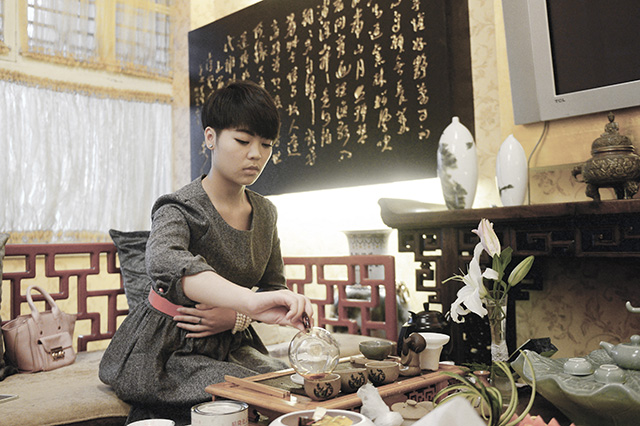 “Customers of this restaurant are those who spend about $1,550 for a meal without hesitation. The gap between the rich and the poor in China is beyond your expectation.”
Chui Meng Die(24) from Hebei is working at a small teahouse located in the corner of a luxury restaurant in Beijing. I opened my eyes wide with surprise to see the prices on the menu. The price for a sip of tea was as high as $20, while for a pot for
4 or 5 cups, $75. Considering the average price of lunch among working people is $5, the price of a teapot is as high as the price of 16 meals.
“Customers of this restaurant are those who spend about $1,550 for a meal without hesitation. The gap between the rich and the poor in China is beyond your expectation.”
Chui Meng Die(24) from Hebei is working at a small teahouse located in the corner of a luxury restaurant in Beijing. I opened my eyes wide with surprise to see the prices on the menu. The price for a sip of tea was as high as $20, while for a pot for
4 or 5 cups, $75. Considering the average price of lunch among working people is $5, the price of a teapot is as high as the price of 16 meals.
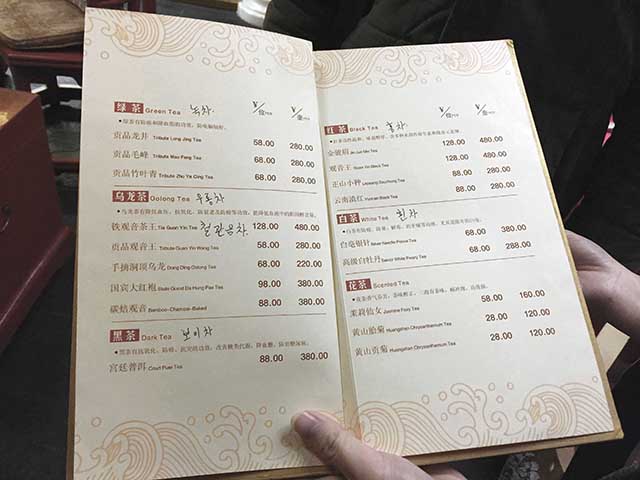 After hearing about the gold spoon and earth spoon syndrome in Korea, Chui Meng Die said “Discrimination and unfairness by money and power prevail everywhere in our daily life in China”, and added “Some positions or jobs in the civil
service are only for children of high-ranking officials or the rich families no matter how competent you are”. A Chinese person interested in Korea mentioned that CCTV, Chinese state media, only hires children of executives or
high-ranking officials based on Guanxi without open recruitment.
According to UNESCO, the college entrance rate in China keeps increasing more than 1% every year, from 15% in 2003 to 26.7% in 2012. As the number of universities and capacity have been increased a lot since 1980 and as parents put
their best efforts in educating their children under the one-child policy, the number of students who enter universities in big cities from local areas also jumped. The economic condition of China, however, cannot provide adequate
working positions to all college graduates that are well matched to their education level. The situation leads to the result that student from local provinces became the poor in the city after graduation. Chui Meng Die said “Many
college students cannot take advantage of their majors and be treated as much as they learned” and “Even many of them earn less than me who make money about $770 a month”.
After hearing about the gold spoon and earth spoon syndrome in Korea, Chui Meng Die said “Discrimination and unfairness by money and power prevail everywhere in our daily life in China”, and added “Some positions or jobs in the civil
service are only for children of high-ranking officials or the rich families no matter how competent you are”. A Chinese person interested in Korea mentioned that CCTV, Chinese state media, only hires children of executives or
high-ranking officials based on Guanxi without open recruitment.
According to UNESCO, the college entrance rate in China keeps increasing more than 1% every year, from 15% in 2003 to 26.7% in 2012. As the number of universities and capacity have been increased a lot since 1980 and as parents put
their best efforts in educating their children under the one-child policy, the number of students who enter universities in big cities from local areas also jumped. The economic condition of China, however, cannot provide adequate
working positions to all college graduates that are well matched to their education level. The situation leads to the result that student from local provinces became the poor in the city after graduation. Chui Meng Die said “Many
college students cannot take advantage of their majors and be treated as much as they learned” and “Even many of them earn less than me who make money about $770 a month”.
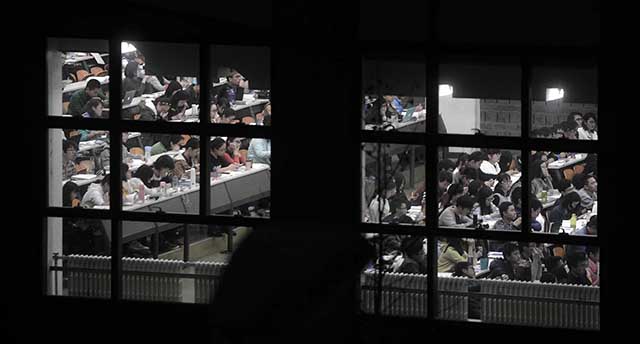 Chui Meng Die, however, stressed that China still has a lot of opportunities and hope as she, whose highest level of education is middle school, is treated better than college graduates as a manager of teahouse. “Although Chinese
people also disregard some jobs including immigrant workers or restaurant employees, there are unlimited opportunities to feel the sense of achievement other than studying, for example, by learning techniques like me” she said,
adding “Customers at the teahouse are far from looking down on or treating me poorly just because they are rich. Rather they respect me”. Then she smiled saying “We call a teapot ‘Gong Dao Bei’ which means everyone is equal at
the moment drinking tea”.
It is heard that it is not easy for those who are from the provinces to survive in Beijing, so I was wondering about how she is planning her own future.
“Of course I would face a lot of obstacles including the expensive house price to live in Beijing by myself, so I might get married to a good guy. My biggest dream is to open my own tea house within 10 or 20 years. It would be difficult
but I believe it is still the future I can dream of.”
Chui Meng Die, however, stressed that China still has a lot of opportunities and hope as she, whose highest level of education is middle school, is treated better than college graduates as a manager of teahouse. “Although Chinese
people also disregard some jobs including immigrant workers or restaurant employees, there are unlimited opportunities to feel the sense of achievement other than studying, for example, by learning techniques like me” she said,
adding “Customers at the teahouse are far from looking down on or treating me poorly just because they are rich. Rather they respect me”. Then she smiled saying “We call a teapot ‘Gong Dao Bei’ which means everyone is equal at
the moment drinking tea”.
It is heard that it is not easy for those who are from the provinces to survive in Beijing, so I was wondering about how she is planning her own future.
“Of course I would face a lot of obstacles including the expensive house price to live in Beijing by myself, so I might get married to a good guy. My biggest dream is to open my own tea house within 10 or 20 years. It would be difficult
but I believe it is still the future I can dream of.”
‘Different but same’ three points of view toward the unemployment crisis
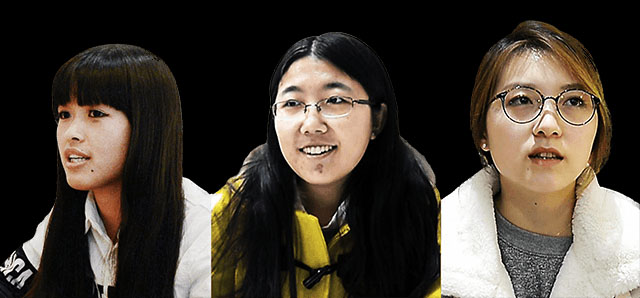 “It’s not that the employment itself became difficult. Since many young generations were grown on a pedestal and have a high education level, they cannot accept the fact to start from a low position.”- Guo Jing(21), working at a
travel company after graduating a vocational school
“The low employment rate does not mean it’s hard to get a job. Due to the rapid development, China wants talent. However, it is a matter of personal choice of those with a high education level to avoid positions with low salary.”
– Jang Wui Ling (19), attending the national college of Education in Hebei
“I don’t think that the economic development influences personal employment issues a lot. Eventually, the employment depends on the diploma. The graduates from Beijing University or Tsinghua University don’t worry about finding a
job in good or bad economic conditions.” – Le Wui Lei (26), working at Seonbong financial company after graduating a college of science and engineering in Shenyang
Three young men with different backgrounds have similar but little different opinions toward the employment problem. They shared the idea that the employment itself didn’t become difficult, and emphasized that the reason of the employment
problem stemmed from young people who were grown in a sheltered environment, it is a matter of different personal values, and the title of the university has a decisive effect on the employment. Their opinions are in contradiction
to the analysis of foreign countries arguing that the employment crisis of China came from political and structural problems. Why do Chinese young men make the employment crisis a matter of themselves? I could assume the reason
from the interview with another student.
“It’s not that the employment itself became difficult. Since many young generations were grown on a pedestal and have a high education level, they cannot accept the fact to start from a low position.”- Guo Jing(21), working at a
travel company after graduating a vocational school
“The low employment rate does not mean it’s hard to get a job. Due to the rapid development, China wants talent. However, it is a matter of personal choice of those with a high education level to avoid positions with low salary.”
– Jang Wui Ling (19), attending the national college of Education in Hebei
“I don’t think that the economic development influences personal employment issues a lot. Eventually, the employment depends on the diploma. The graduates from Beijing University or Tsinghua University don’t worry about finding a
job in good or bad economic conditions.” – Le Wui Lei (26), working at Seonbong financial company after graduating a college of science and engineering in Shenyang
Three young men with different backgrounds have similar but little different opinions toward the employment problem. They shared the idea that the employment itself didn’t become difficult, and emphasized that the reason of the employment
problem stemmed from young people who were grown in a sheltered environment, it is a matter of different personal values, and the title of the university has a decisive effect on the employment. Their opinions are in contradiction
to the analysis of foreign countries arguing that the employment crisis of China came from political and structural problems. Why do Chinese young men make the employment crisis a matter of themselves? I could assume the reason
from the interview with another student.
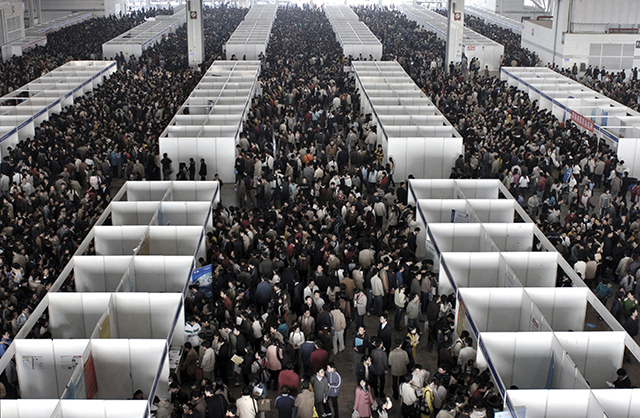 Chao Lin Mao (26), studying economics of the West at the graduate school of Central University of Nationalities, said “Chinese government is trying to change the current development model which is based on resource consumption and
low-salary through industrial restructuring, encouraging people to start business, and two-children-one-family policy” and “They are responding well to prevent a sudden drop of economic growth rates”. In other words, unbounded
trust in the government and identification themselves with the country have moved the domain of structural limitation of the society to the personal sphere.
However, the distortion of recognition is not always bad for young generations in China. At least until now, it does not lead to self-blaming and disincentive, but rather acts as the spark of hope.
The first salary of Li Wui Lei at a magazine company in Beijing in 2012 was $280 a month. As she changed her jobs to the advertisement company, O2O company (Online to Offline, a distribution channel that combines the online commerce
platform and offline stores), and the financial company, her salary has increased to $777, $1238, and $1862 respectively. Her income has jumped by more than 6 times just in 3 years.
There were many opinions about the employment problem, but they talked about the life with hope in one voice.
Chao Lin Mao (26), studying economics of the West at the graduate school of Central University of Nationalities, said “Chinese government is trying to change the current development model which is based on resource consumption and
low-salary through industrial restructuring, encouraging people to start business, and two-children-one-family policy” and “They are responding well to prevent a sudden drop of economic growth rates”. In other words, unbounded
trust in the government and identification themselves with the country have moved the domain of structural limitation of the society to the personal sphere.
However, the distortion of recognition is not always bad for young generations in China. At least until now, it does not lead to self-blaming and disincentive, but rather acts as the spark of hope.
The first salary of Li Wui Lei at a magazine company in Beijing in 2012 was $280 a month. As she changed her jobs to the advertisement company, O2O company (Online to Offline, a distribution channel that combines the online commerce
platform and offline stores), and the financial company, her salary has increased to $777, $1238, and $1862 respectively. Her income has jumped by more than 6 times just in 3 years.
There were many opinions about the employment problem, but they talked about the life with hope in one voice.
“As long as you work hard, no Chinese person would be frustrated by social problems.”- Guo Jing
“Hope depends on the self-satisfaction. Since I don’t have much expectation, I think I can live a life that I want.” – Jang Wui Ling
“If any one does his endeavor to accumulate abilities like me, there never be a failure.” – Li Wui Lei
‘Being positive is my energy’ young entrepreneurs in China
Central University of Nationalities, the national key university for talented students of minorities in China, is located in Haidian, Beijing, along with Peking University, Tsinghua University, and Renmin University. Recently the university held a Business Competition for graduate students. The competition is held every two years for undergraduates, but it was the first time to be held for graduate students. It is a real-practice type competition to give opportunities to launch business by connecting to related companies for 6 teams out of 31 participants. Xiao Di, a team leader, said “The prize for the winner is $777. Regardless of the prize, however, I am so eager to be the winner because I can realize my business item with a large company including Alibaba.”
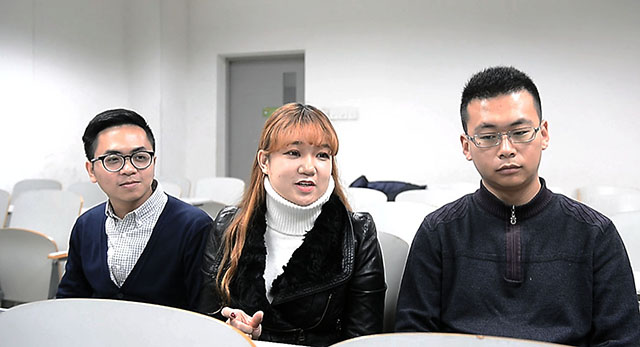 Actually, this is not the first business competition for them. They already participated in the competition when they were undergraduates. In particular, Fang Yi took part at the national competition with her business idea of the
marriage agency specialized for Chinese Muslims. Chao Lin Mao asserted “More and more college students in China are paying attention to start their own business” adding “We are highly influenced by the policy announced by Premier
Le Keqiang targeting ‘Launching business of the public, Focus on the creation and innovation”.
According to the current situation data by economic indicators of the third quarter in 2005 by the National Bureau of Statistics of China, the supporting policy for launching business focused on the benefit of tax exemption and the
incubator establishment really works. The number of newly registered company for the six months of 2015 has increased by 19.4% compared to the same periods of the previous year, while the newly registered capital has grown by 43%.
Also, the portion of population who launches business of the total employment population has went up by 0.11% compared to January. Considering the total population of China of 1.3billion, the 0.1% of total employment population
is the figure which cannot be negligible ever. Particularly, the report from the market research center of Peking University, shows that 15.6% of Jiulinghou college graduates wants to start their own business.
Actually, this is not the first business competition for them. They already participated in the competition when they were undergraduates. In particular, Fang Yi took part at the national competition with her business idea of the
marriage agency specialized for Chinese Muslims. Chao Lin Mao asserted “More and more college students in China are paying attention to start their own business” adding “We are highly influenced by the policy announced by Premier
Le Keqiang targeting ‘Launching business of the public, Focus on the creation and innovation”.
According to the current situation data by economic indicators of the third quarter in 2005 by the National Bureau of Statistics of China, the supporting policy for launching business focused on the benefit of tax exemption and the
incubator establishment really works. The number of newly registered company for the six months of 2015 has increased by 19.4% compared to the same periods of the previous year, while the newly registered capital has grown by 43%.
Also, the portion of population who launches business of the total employment population has went up by 0.11% compared to January. Considering the total population of China of 1.3billion, the 0.1% of total employment population
is the figure which cannot be negligible ever. Particularly, the report from the market research center of Peking University, shows that 15.6% of Jiulinghou college graduates wants to start their own business.
 They, all Jiulinghou generations, participated in the competition with a business item ‘Jiulinghou-themed comprehensive rest area’ based on the calculation that Jiulinghou generations who have strong spending habits would open their
wallets if their hearts are moved by childhood memories which are gradually faded out. Of course, they came to the conclusion after the careful market investigation.
Why are they attracted to launching business like a magnet? Xiao Di claimed “Entering a company could be stable but it would be regrettable forever if I won’t realize my long-cherished dream” adding “I might fail but I have nothing
to lose now. Even if I would fail eventually, I could recharge myself and learn more.”
In Korea, it is known as a number of young people in China turned their eyes to launching business to be benefited from the government support because of the employment crisis, however, young entrepreneurs who I met in China said
it is “long-cherished dream from childhood”. I met another young man who is proceeding step by step to reach his dream.
They, all Jiulinghou generations, participated in the competition with a business item ‘Jiulinghou-themed comprehensive rest area’ based on the calculation that Jiulinghou generations who have strong spending habits would open their
wallets if their hearts are moved by childhood memories which are gradually faded out. Of course, they came to the conclusion after the careful market investigation.
Why are they attracted to launching business like a magnet? Xiao Di claimed “Entering a company could be stable but it would be regrettable forever if I won’t realize my long-cherished dream” adding “I might fail but I have nothing
to lose now. Even if I would fail eventually, I could recharge myself and learn more.”
In Korea, it is known as a number of young people in China turned their eyes to launching business to be benefited from the government support because of the employment crisis, however, young entrepreneurs who I met in China said
it is “long-cherished dream from childhood”. I met another young man who is proceeding step by step to reach his dream.
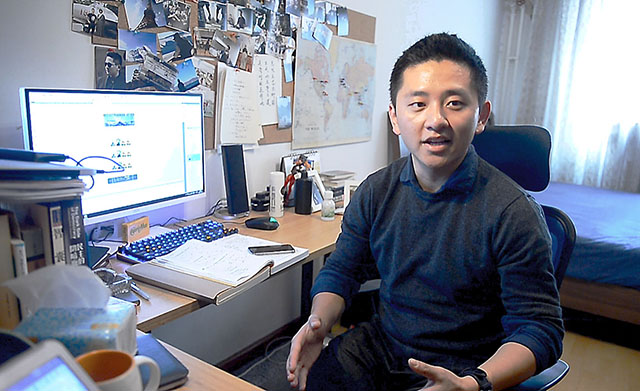 Li Ping Jang from Chengdu, Sichuan, graduated Fudan University, the prestigious university in Shanghai. He finished the management trainee course at DHC, a Japanese cosmetic company, during his senior year at the university. Although
he was a trainee, since it was a course related to the employment, he received $1,240 a month. Considering that the average monthly payment of Jiulinghou college graduates was $420 in 2015, the amount of money he received was a
good sum. After graduation, however, he abandoned the opportunity for a permanent position and decided to go to Beijing. Under the judgement he needed to emphasize basic skills before opening a travel company which was his dream
at the university, he got a job at the largest online travel company in China. He gained a great recognition at the company so that his received as much as $2640 a month. However, the high salary could not stop him challenging
his dream.
“There are many beautiful places in China. In particular, the scenery of the road from Sichuan, my home town, to Tibet is breathtaking. Koreans, however, are well aware of Beijing, Shanghai, and Hong Kong, while they have no idea
about very fun and beautiful cities including Chengdu or Xian. So I want to introduce the hidden beauty of China to foreigners.”
Li Ping Jang launched a travel company ‘Hi China’ in September, 2015. He is realizing his rough sketch with 5 colleagues of one mind living under the same roof.
Li Ping Jang from Chengdu, Sichuan, graduated Fudan University, the prestigious university in Shanghai. He finished the management trainee course at DHC, a Japanese cosmetic company, during his senior year at the university. Although
he was a trainee, since it was a course related to the employment, he received $1,240 a month. Considering that the average monthly payment of Jiulinghou college graduates was $420 in 2015, the amount of money he received was a
good sum. After graduation, however, he abandoned the opportunity for a permanent position and decided to go to Beijing. Under the judgement he needed to emphasize basic skills before opening a travel company which was his dream
at the university, he got a job at the largest online travel company in China. He gained a great recognition at the company so that his received as much as $2640 a month. However, the high salary could not stop him challenging
his dream.
“There are many beautiful places in China. In particular, the scenery of the road from Sichuan, my home town, to Tibet is breathtaking. Koreans, however, are well aware of Beijing, Shanghai, and Hong Kong, while they have no idea
about very fun and beautiful cities including Chengdu or Xian. So I want to introduce the hidden beauty of China to foreigners.”
Li Ping Jang launched a travel company ‘Hi China’ in September, 2015. He is realizing his rough sketch with 5 colleagues of one mind living under the same roof.
 About the ultimate dream, Li Ping Jang said “Although I cannot make good money, I want to do what I like and what is helpful to others.” Also, he added “Furthermore, my goal is to build a platform like Google or Facebook that employees
from various nationalities could communicate with and understand China”.
He didn’t achieve any results yet, but I could feel great confidence from his way of speaking and actions.
“Even if I cannot succeed this time, I can start again” he said. Are all Chinese young generations ebullient like him?
Li Ping Jang said “But there are a lot of people who start business only to make money while they don’t know what they want to do” and “Many young people try to reach for the stars in the sky like Jack Ma, but they cannot see the
trap under their feet”. Then he added “A new word ‘Diaosi (Chinese word for loser referring a man who does not have a house and girlfriend, a new word took the no.1 ranking of Buzzword of Chinese online sites in 2012)’ is popular
in China” and “Like the phrase in the novel of Dickens, China is currently enjoying ‘the best of time and the worst of time’”.
Obviously, however, the rapid growth of Chinese IT companies including Alibaba, Tencent, and Baidu gives opportunities and hope to many people.
About the ultimate dream, Li Ping Jang said “Although I cannot make good money, I want to do what I like and what is helpful to others.” Also, he added “Furthermore, my goal is to build a platform like Google or Facebook that employees
from various nationalities could communicate with and understand China”.
He didn’t achieve any results yet, but I could feel great confidence from his way of speaking and actions.
“Even if I cannot succeed this time, I can start again” he said. Are all Chinese young generations ebullient like him?
Li Ping Jang said “But there are a lot of people who start business only to make money while they don’t know what they want to do” and “Many young people try to reach for the stars in the sky like Jack Ma, but they cannot see the
trap under their feet”. Then he added “A new word ‘Diaosi (Chinese word for loser referring a man who does not have a house and girlfriend, a new word took the no.1 ranking of Buzzword of Chinese online sites in 2012)’ is popular
in China” and “Like the phrase in the novel of Dickens, China is currently enjoying ‘the best of time and the worst of time’”.
Obviously, however, the rapid growth of Chinese IT companies including Alibaba, Tencent, and Baidu gives opportunities and hope to many people.
 Mei Jing Jing (22) was a TA at a kindergarten after graduating a 3-year course vocational school with a monthly payment at $460. In 2015, however, she became a business woman with a monthly income at $7,775 by starting selling diet
products via We Chat, the Chinese version of Kakao Talk released by Tencent. Mei Jing Jing said “The gap between the rich and the poor is a problem beyond control, but young people can find new opportunities through smart phones
and Internet” adding “If you think positively and endeavor a lot, the future cannot be dark”.
☞Go to the menu
Mei Jing Jing (22) was a TA at a kindergarten after graduating a 3-year course vocational school with a monthly payment at $460. In 2015, however, she became a business woman with a monthly income at $7,775 by starting selling diet
products via We Chat, the Chinese version of Kakao Talk released by Tencent. Mei Jing Jing said “The gap between the rich and the poor is a problem beyond control, but young people can find new opportunities through smart phones
and Internet” adding “If you think positively and endeavor a lot, the future cannot be dark”.
☞Go to the menu

 The big story of Korea in 2015 was ‘Hell-Joseon’.
The big story of Korea in 2015 was ‘Hell-Joseon’.
Young generations who are worn out from making great endeavors consider hope as extravagance. Their hearts were filled with pent-up anger. It is, however, not easy to change the world overnight. Young people in a deadlock ridicule themselves against ‘the gold spoon’, which refers those who were born with a gold spoon in Korea, while some find comfort from the comparative advantage made by discrimination.
While we are suffering so hard like this, I was curious about the stories of youth in neighboring countries. On a moment thought, it is reasonable that young men in Japan would be Satori generations who are enlightened even on temporary works based on the lost two decades from the 1990s, while Chinese young people, who are the generations of ‘Little emperor’, should become disillusioned with ‘Guanxi (personal relations)’which is even incomparable to ‘the gold spoon’.
So I met young people in Seoul, Tokyo, and Beijing in person. They are not special characters, but just ordinary people like friends, brothers, or sisters around us. How are the ordinary lives of the youth in the neighboring countries, China and Japan, where are simply considered as the past and the future of Korea, different from ours?
English
-
China
“There is no option but a share house”
Like other capital cities in all countries, Beijing is one of the cities where young Chinese people admire, because it is the center of administration with excellent infrastructures of commerce, industry, and culture. However, it is almost impossible for young people from provinces to be settled in Beijing. First, it is because of the high cost of housing beyond capacity. The housing problem in Beijing shows a gap between the rich and the poor most clearly. Beijing is divided into 6 rings on the basis of ring-shaped main roads. Mei Jing Jing (22) said “In Beijing, the closer to the center by a ring, the higher the price of the house” and “It is impossible to afford the high house price by working in the town right after graduation”. Therefore, young men from local areas are pushed out to the dosshouse with low price outside Beijing, and got a nickname ‘the ant tribe’ by the book published by Professor Lianxi of the department of foreign trade and economics in 2009. At that time, the number of ant tribe in Beijing was assumed to reach at 100,000.
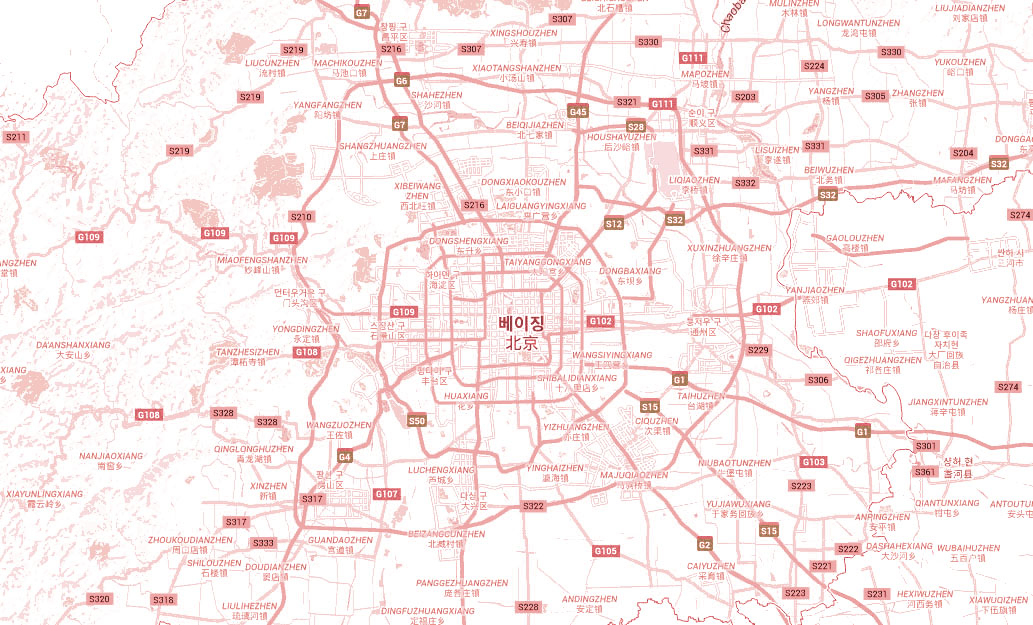 It is easy to find the reality of housing poor not only from the ant tribe but also from the lives of young people living in Beijing. Wangjing, Chaoyang, which is located between ring 4 and ring 5, is the residential area at the
north-east of Beijing. I met Tian Fei(32) and Wang Fei(assumed name. 31) at there who are home-mates, renting different rooms of the single house. A share house is the most popular type of housing for young people in Beijing.
It is easy to find the reality of housing poor not only from the ant tribe but also from the lives of young people living in Beijing. Wangjing, Chaoyang, which is located between ring 4 and ring 5, is the residential area at the
north-east of Beijing. I met Tian Fei(32) and Wang Fei(assumed name. 31) at there who are home-mates, renting different rooms of the single house. A share house is the most popular type of housing for young people in Beijing.
 Tian Fei, who answered tartly that she is from the outskirts of Beijing, had lived in an apartment, where hundreds of people were living together, after graduating the university in 2006. The basement she chose for a low price of
$46 could afford just one bed inside, and she had to use a public shower room and toilet. 100 people shared one toilet and she had to wait for a long time to use the shower room at $0.7. In 2007, the rent went up to $76 as she
moved to the room on the ground. Then she moved to the room with the rent of $115. At there, the living room of the apartment was divided into two space, and she shared one of them with her roommate. 12 people in total were living
in the apartment together.
Tian Fei, who answered tartly that she is from the outskirts of Beijing, had lived in an apartment, where hundreds of people were living together, after graduating the university in 2006. The basement she chose for a low price of
$46 could afford just one bed inside, and she had to use a public shower room and toilet. 100 people shared one toilet and she had to wait for a long time to use the shower room at $0.7. In 2007, the rent went up to $76 as she
moved to the room on the ground. Then she moved to the room with the rent of $115. At there, the living room of the apartment was divided into two space, and she shared one of them with her roommate. 12 people in total were living
in the apartment together.
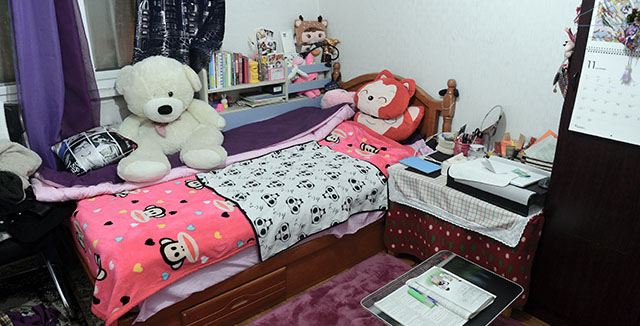 In 2010, she moved to the present apartment in Wangjing. She paid $153 for the biggest room of 3 rooms living alone. The rent has increased by $15 every year, so she is now paying $230. The rent is quite tough for Tian Fei who makes
$615 a month on average by working as a private Chinese language tutor. Currently, 3 people are living together but before, 7 people in total, with 3 couples, had lived in the apartment while a newly married couple took the biggest
living room.
In 2010, she moved to the present apartment in Wangjing. She paid $153 for the biggest room of 3 rooms living alone. The rent has increased by $15 every year, so she is now paying $230. The rent is quite tough for Tian Fei who makes
$615 a month on average by working as a private Chinese language tutor. Currently, 3 people are living together but before, 7 people in total, with 3 couples, had lived in the apartment while a newly married couple took the biggest
living room.
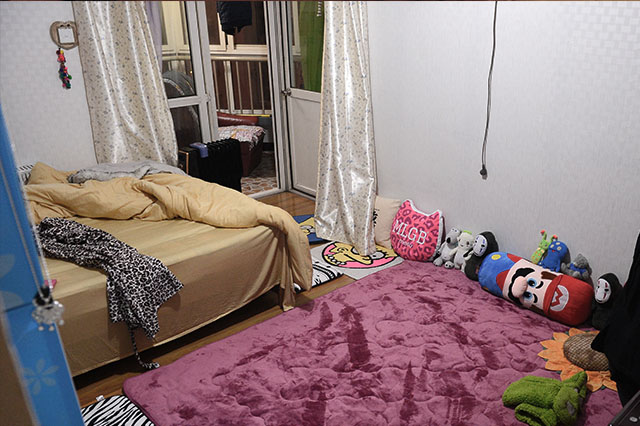 Now Wang Fei is living in the living room that is partitioned with a screen at a monthly rent of $247. Wang Fei from Jilin province had worked in Shenzhen, Guangdong, after graduating the university in Hunan before coming to Beijing
in 2009. The first house, an hour away from her company, was a room of the apartment in which 3 people had lived together by paying $200. To live in a studio or efficiency apartment in the same neighborhood, the rent is from $538
to $615. Tian Fei confessed “I enjoy the friendship with Wang Fei now, but I’ve never been in a close relationship with other home mates so far” and “I’ve locked my door always due to the lack of mutual trust”.
Now Wang Fei is living in the living room that is partitioned with a screen at a monthly rent of $247. Wang Fei from Jilin province had worked in Shenzhen, Guangdong, after graduating the university in Hunan before coming to Beijing
in 2009. The first house, an hour away from her company, was a room of the apartment in which 3 people had lived together by paying $200. To live in a studio or efficiency apartment in the same neighborhood, the rent is from $538
to $615. Tian Fei confessed “I enjoy the friendship with Wang Fei now, but I’ve never been in a close relationship with other home mates so far” and “I’ve locked my door always due to the lack of mutual trust”.
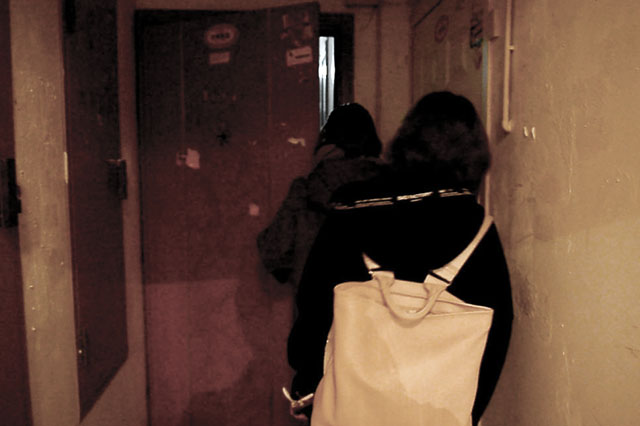 However, there’s no option but to live in a share house over the inconvenience and anxiety in reality. Wang Fei said “To live alone, I have to pay the half of my monthly income, $1537, so I’ve never thought about it”. Tian Fei, who
has to spend the whole paycheck on the monthly rent, even has no choice. Tian Fei said “Jiulinghou generations or those who were born in the late 80s are different from bailinghou generations” adding “Although there is only a ten-year
gap, there are quite a few friends who are living alone by the help of affluent parents”.
However, there’s no option but to live in a share house over the inconvenience and anxiety in reality. Wang Fei said “To live alone, I have to pay the half of my monthly income, $1537, so I’ve never thought about it”. Tian Fei, who
has to spend the whole paycheck on the monthly rent, even has no choice. Tian Fei said “Jiulinghou generations or those who were born in the late 80s are different from bailinghou generations” adding “Although there is only a ten-year
gap, there are quite a few friends who are living alone by the help of affluent parents”.
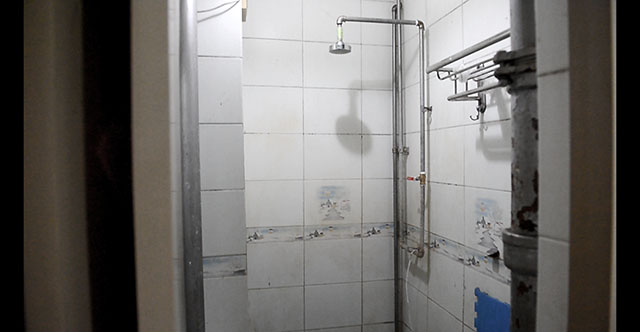
Hukou, a sticking point of young people from the provinces… The city of love and hatred, Beijing
The second reason is that although you have a house, you have to endure many disadvantages if you do not have a Hukou (household registration system of China). Li Wui Lei is living alone in Chaoyang district. It is located outside the ring 5 but still a good neighborhood to live in. When she moved to Beijing in 2012, she bought an apartment as big as 64㎡ at $307,560. Her parents provided the down payment of $213,584, and she made a loan about $93,976 for the rest of house price. So now she is paying off the loan by herself, by paying $769 every month out of her monthly income, $1,862. Li Wui Wei said “I assumed that buying a house would be advantageous as an investment than paying a monthly rent” and “However, since many people cannot afford the high down payment and do not want to live in Beijing for a long time, they do not buy a house”. She told that her friends from provinces go back home at the age of 35 for men, 30 for women on average. The reason why they decided to go back home is it is hard to obtain the hukou in Beijing.
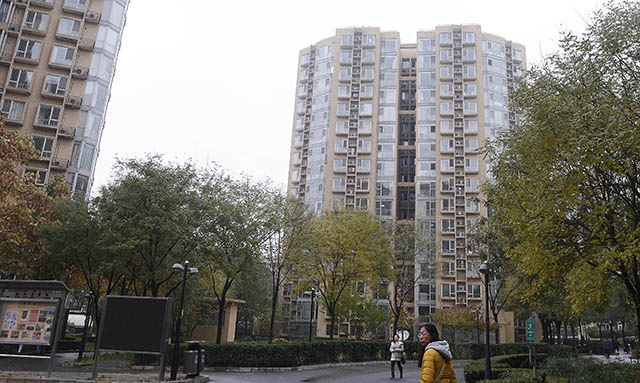 The hukou system of China is the legal right of residence in a certain area as well as the right to enjoy the welfare benefits. In other words, those who are from other provinces who do not have a hukou cannot be guaranteed rights
and benefits. Some of many Beipiao tribe (people who left their home and are working or living in Beijing) believe that the government could abolish the hukou limits in Beijing, but it is not. All mayors of the city who answered
the survey of the household registration system improvement were against to relax the hukou system. They did not want to share the limited privileges.
For Li Wui Wei as well, it is hard to obtain the Beijing hukou. She said “I want to live in Beijing after getting married but to do so, I should get married to a man who was born in Beijing” adding “The children of a couple from
other provinces cannot have a hukou in Beijing so they cannot go to the public school which offers high-quality education”.
☞ Go to the menu
The hukou system of China is the legal right of residence in a certain area as well as the right to enjoy the welfare benefits. In other words, those who are from other provinces who do not have a hukou cannot be guaranteed rights
and benefits. Some of many Beipiao tribe (people who left their home and are working or living in Beijing) believe that the government could abolish the hukou limits in Beijing, but it is not. All mayors of the city who answered
the survey of the household registration system improvement were against to relax the hukou system. They did not want to share the limited privileges.
For Li Wui Wei as well, it is hard to obtain the Beijing hukou. She said “I want to live in Beijing after getting married but to do so, I should get married to a man who was born in Beijing” adding “The children of a couple from
other provinces cannot have a hukou in Beijing so they cannot go to the public school which offers high-quality education”.
☞ Go to the menu -
Korea
“A sad life, not different from illegal immigrants”
If there are dosshouses and share houses in China, there are goshiwons and cramped studios in Korea. You are making a mistake if you think the condition would be pleasant to use the space alone. This is comparing apples and oranges. “I spent large sums of money to buy this headphone 10 years ago. I don’t use it that much now but I couldn’t sleep without it at that time.”
 Jae-Yong Hwang (27) said showing his thick headphone. When he was preparing the school qualification exam while wandering around from goshiwon to livingtel, the headphone was essential to be free from unwanted noise from the next
room. He had gone through consecutive sufferings, starting from the goshiwon in Changshin-dong, Jongro-gu, where he stayed when he came to Seoul in 2004, to the present 23㎡ semi-basement room (deposit: $8,543, monthly rent: $282)
in Sadang-dong.
“I moved to this room in February, 2015, but still I’m often filled with emotions when I come into the room” said Mr. Hwang, adding “I am living in the house which can be registered under my name for the first time after coming to
Seoul 11 years ago”. It was even hard to imagine if his sister didn’t provide him the deposit of the house.
“I’ve wandered around goshiwon, houses of relatives, friends, or acquaintances, dormitory, livingtel, and others for about 11 years. Since I keep changing my residence, I had lived in almost all neighborhoods in Seoul including Changshin-dong,
Dongdaemun, Suyouri, Garak market, Bangyi-dong, Wangshimli, East-Incheon, Dong-am, Shimgok-dong, Buchoen…”
Jae-Yong Hwang (27) said showing his thick headphone. When he was preparing the school qualification exam while wandering around from goshiwon to livingtel, the headphone was essential to be free from unwanted noise from the next
room. He had gone through consecutive sufferings, starting from the goshiwon in Changshin-dong, Jongro-gu, where he stayed when he came to Seoul in 2004, to the present 23㎡ semi-basement room (deposit: $8,543, monthly rent: $282)
in Sadang-dong.
“I moved to this room in February, 2015, but still I’m often filled with emotions when I come into the room” said Mr. Hwang, adding “I am living in the house which can be registered under my name for the first time after coming to
Seoul 11 years ago”. It was even hard to imagine if his sister didn’t provide him the deposit of the house.
“I’ve wandered around goshiwon, houses of relatives, friends, or acquaintances, dormitory, livingtel, and others for about 11 years. Since I keep changing my residence, I had lived in almost all neighborhoods in Seoul including Changshin-dong,
Dongdaemun, Suyouri, Garak market, Bangyi-dong, Wangshimli, East-Incheon, Dong-am, Shimgok-dong, Buchoen…”
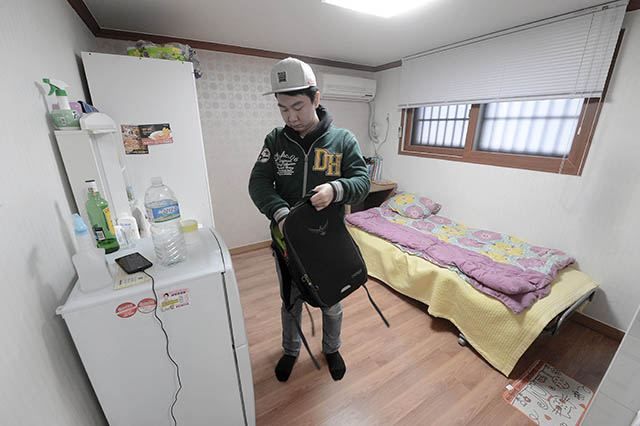 After naming the infinite list of neighborhoods, Mr. Hwang said “I have a 10-year old suitcase. I don’t unpack when I move to a new place, but just open it” and “because I am sick of my life of packing and moving”. He put the suitcase
open in a corner of the room, and keep clothes inside after doing the laundry. In order to be ready to move out anytime.
“Recently I am reading a book titled ‘Arc de Triomphe’(a novel about the Second World War written by German writer, E. M. Remarque), and the hero of the book is an illegal German immigrant who stole in Paris. He keeps his bag open
because he doesn’t know when he would be censored by Nazis. Like myself as I am now. I realized yet again how sad my life has been which is not different from illegal immigrants.”
For Mr. Hwang who makes living like a grasshopper, it was a livingtel where gave him unforgettable happiness. The fact that he could take a shower in a small bathroom inside the livingtel was the most enchanting memory of him for
the last 11 years.
After naming the infinite list of neighborhoods, Mr. Hwang said “I have a 10-year old suitcase. I don’t unpack when I move to a new place, but just open it” and “because I am sick of my life of packing and moving”. He put the suitcase
open in a corner of the room, and keep clothes inside after doing the laundry. In order to be ready to move out anytime.
“Recently I am reading a book titled ‘Arc de Triomphe’(a novel about the Second World War written by German writer, E. M. Remarque), and the hero of the book is an illegal German immigrant who stole in Paris. He keeps his bag open
because he doesn’t know when he would be censored by Nazis. Like myself as I am now. I realized yet again how sad my life has been which is not different from illegal immigrants.”
For Mr. Hwang who makes living like a grasshopper, it was a livingtel where gave him unforgettable happiness. The fact that he could take a shower in a small bathroom inside the livingtel was the most enchanting memory of him for
the last 11 years.
A sad reality to find my happiness from other’s misfortune
“Oh, my mom should not watch this…. She was sad even when I got this room at first, while I was happy that I found a good one.” Only one man could lie down with little margins when excluding the space of household goods inside Byung-Woo Kang’s 6.6㎡ room. When comparing Mr. Kang, a graduate student, and Jae-Yong Hwang, a jobless with a high-school diploma, it could be thought that, putting others aside, Mr. Hwang is enjoying a comparative advantage at least for the housing environment. Therefore, it was likely for his mom to be sad when looking for a room.
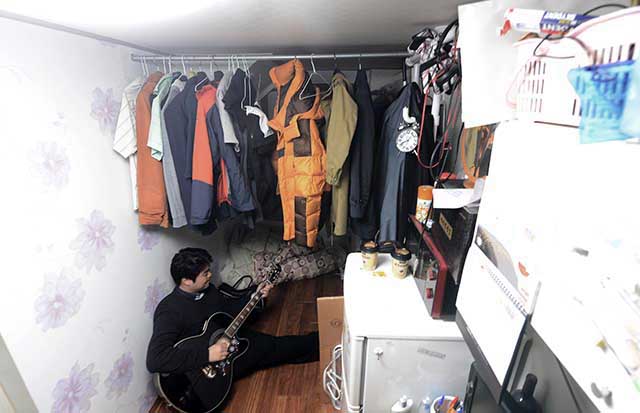 Rather, Mr. Kang insisted that there is no house which has better cost-effectiveness in the neighborhood. No matter what it looks like, the rent for his house is of $42,717. It was fortunate to find the house on a deposit basis because
of the shortage of places being leased. His father made a loan to provide the key money. Kang said “There’s a rent room on a deposit of $59,803 if you go up one more hill from here” and “I sweat buckets in summer so compared to
the room where the wall is covered with mold, my present house is much more pleasant to live in”.
Rather, Mr. Kang insisted that there is no house which has better cost-effectiveness in the neighborhood. No matter what it looks like, the rent for his house is of $42,717. It was fortunate to find the house on a deposit basis because
of the shortage of places being leased. His father made a loan to provide the key money. Kang said “There’s a rent room on a deposit of $59,803 if you go up one more hill from here” and “I sweat buckets in summer so compared to
the room where the wall is covered with mold, my present house is much more pleasant to live in”.
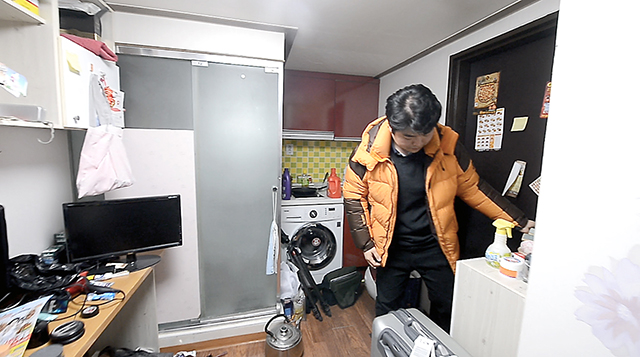 Mr. Kang, who graduated the university in Daejeon, said “When I talk with my hometown friends who are living in Seoul, we laugh for a long time”. Because of the ridiculous gap of housing conditions. “With $42,717, you can even buy
an apartment as big as 66㎡ in Daejeon”, said Mr. Kang, and “My friends and I, three of us once lived in an apartment with two rooms at a monthly rent of $385. The size of one room is three times bigger than the current room” with
pretend laughter.
He was grateful to afford this living conditions in Seoul anyway. Mr. Kang said “If I have a complaint, it should be that I cannot play guitar what I love freely” with “However the reality that I should find the relative happiness
by comparing myself to others is very unfortunate”.
☞Go to the menu
Mr. Kang, who graduated the university in Daejeon, said “When I talk with my hometown friends who are living in Seoul, we laugh for a long time”. Because of the ridiculous gap of housing conditions. “With $42,717, you can even buy
an apartment as big as 66㎡ in Daejeon”, said Mr. Kang, and “My friends and I, three of us once lived in an apartment with two rooms at a monthly rent of $385. The size of one room is three times bigger than the current room” with
pretend laughter.
He was grateful to afford this living conditions in Seoul anyway. Mr. Kang said “If I have a complaint, it should be that I cannot play guitar what I love freely” with “However the reality that I should find the relative happiness
by comparing myself to others is very unfortunate”.
☞Go to the menu -
Japan
The reason why living together of singles in Japan is an experiment
A share house has been a social issue in Japan since the mid 2000’s. Professor, Fukushima Minori at Tokoha University insisted “As dramas and reality shows based on a share house including ‘Spring romance’ (Fuji TV, 2002), ‘A woman of the room share’ (NHK, 2005), ‘Last friends (Fuji TV, 2008), and ‘Terrace house’ (Fuji TV, 2012) have been broadcasted, it was naturally introduced to the public” and “Furthermore, as books about sharing economy became popular, new spending habits and lifestyle by sharing and bonding are taking a lot of attention around the youth”. The number of share houses on the market registered at the Hituji real estate agency specialized in a share house has skyrocketed from 25 in 2005 to 381 in 2008, and to over 1,100 in 2012.
 However, previously, the housing poor problem had been converged as an extreme personal issue. Before 1950’s, the structure of Japanese houses was mostly divided with a thin sliding door, but as a mansion came into wide use after
the war defeat, the unfamiliar concept of privacy had rapidly spread out. As the concept of privacy has integrated with the housing culture of singles, young generations in Japan had no option, but to choose between living with
family members and living alone. We can understand in the same context why the housing problems had become issues only in family or personal scope as shown in Parasite single (a single who does not leave his/her parents even after
becoming an adult) and Net café refugee (a person who is living in an internet café or a comic book store that opens 24 hours) after the collapse of bubble in 1990’s.
Weakening relationship among Japanese young generations underlies the problem. From the perspective that ‘I don’t want to ask a favor of others’ or ‘I have friends to hang out but no one to rely on’, the mechanism of being viable
has worked more actively. According to the research of the Ministry of Health, Labor, and Welfare in 2007, more than 60% of homeless people had been out of contact with parents, while 30% of them showed opinions that ‘I cannot
cause them inconvenience’.
However, previously, the housing poor problem had been converged as an extreme personal issue. Before 1950’s, the structure of Japanese houses was mostly divided with a thin sliding door, but as a mansion came into wide use after
the war defeat, the unfamiliar concept of privacy had rapidly spread out. As the concept of privacy has integrated with the housing culture of singles, young generations in Japan had no option, but to choose between living with
family members and living alone. We can understand in the same context why the housing problems had become issues only in family or personal scope as shown in Parasite single (a single who does not leave his/her parents even after
becoming an adult) and Net café refugee (a person who is living in an internet café or a comic book store that opens 24 hours) after the collapse of bubble in 1990’s.
Weakening relationship among Japanese young generations underlies the problem. From the perspective that ‘I don’t want to ask a favor of others’ or ‘I have friends to hang out but no one to rely on’, the mechanism of being viable
has worked more actively. According to the research of the Ministry of Health, Labor, and Welfare in 2007, more than 60% of homeless people had been out of contact with parents, while 30% of them showed opinions that ‘I cannot
cause them inconvenience’.
Share house ‘Cost Saving +α’
The biggest reason why Japanese singles decide to live in a share house is to save housing expenses. Ah-In Lee(24) had lived with a friend in a room at a monthly rent of $478 when she was a college student. She had worked at part-time job at a lunch box chain store, where paid hourly wages of $7.5, for 3 years to raise cost of living and rent, and also continuously received the scholarship as much as $402 every month for 4 years. So she could save money for a trip to Europe when she graduated the university. Currently, she is paying a monthly rent of $752 for a 16.5㎡ studio in Meguro with her friend. Lee said “You cannot imagine travelling or leisure without room sharing”.
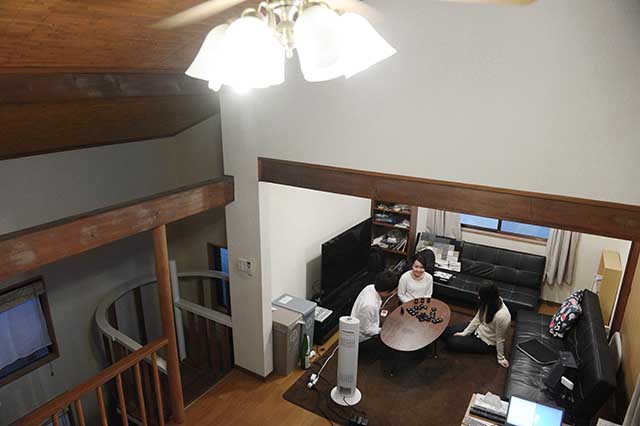 A share house, which is more open than intimacy-oriented room sharing, is expanding its ground by connecting with launching business. Nakahara Taku(26) started a share house business on his senior’s suggestion after graduating Saga
University in Kyushu in Sep, 2014. With the seed money that he and his partner, the senior, invested as much as $4178 respectively, they purchased an empty house near Komazawa University in Setagaya, Tokyo, and did a facelift into
a share house under the name of ‘Hidamari’. Nakahara said “I was worried when launching business because Japanese people are repulsed by interacting with strangers” and “People have fear against
strangers of course, but also latent desire to come along with them at the same time”. He added “There are more people who live alone yet, but I believe there will be more people who want to live in a share house”.
A share house, which is more open than intimacy-oriented room sharing, is expanding its ground by connecting with launching business. Nakahara Taku(26) started a share house business on his senior’s suggestion after graduating Saga
University in Kyushu in Sep, 2014. With the seed money that he and his partner, the senior, invested as much as $4178 respectively, they purchased an empty house near Komazawa University in Setagaya, Tokyo, and did a facelift into
a share house under the name of ‘Hidamari’. Nakahara said “I was worried when launching business because Japanese people are repulsed by interacting with strangers” and “People have fear against
strangers of course, but also latent desire to come along with them at the same time”. He added “There are more people who live alone yet, but I believe there will be more people who want to live in a share house”.
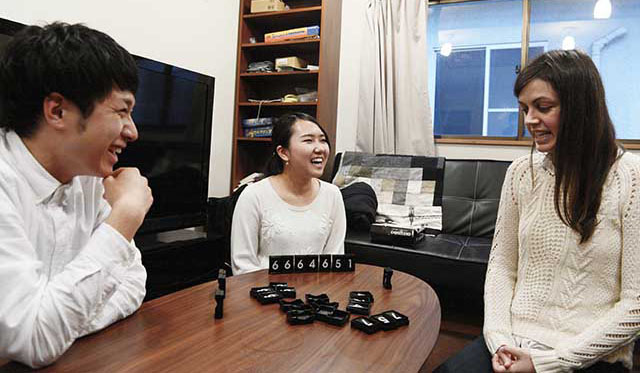 As Mihita Maho(21) and Nicole Gallagher(33) who are living there said they would recommend living in a share house without hesitation, Nakahara’s opinion seemed not only a desire of an entrepreneur. While living in a share house
at a monthly rent of $333, they were seeking values not only of cost saving, but also of making relationship.
Miss. Gallagher from Canada is a foreign language teacher who has lived in Japan for 6 years. She, who had lived alone for 5 years, said “I am happily satisfied with that I am living with somebody who I can have a usual talk about
our daily lives in Tokyo, where I have no friend at all” and “Also, it is a great advantage that I can understand Japanese culture more deeply by interacting with Japanese friends”.
Mihita, who had worked at a healthy food company after graduating a community college in Kumamoto, moved to Tokyo in mid-October. While she was looking for residence, she chose a share house where she could save the initial cost
(In Japan, the initial cost is high because a tenant should pay not only brokerage to the real estate agent but also reward to a house owner). Since she had live in a dormitory for a long time, she did not feel uncomfortable against
communal living. With the monthly salary of $1,000 at the previous company, she saved $8,355 for a year and a half. Why she saved money so tenaciously is to accomplish her dream. Now she is attending a special school for food coordinators
with the savings.
Mihita said “Unlike a dormitory, it is good that you can hear stories of those who have various jobs and experiences in a share house” and “Sharing worries, receiving advice on Tokyo life that I’m not aware of, and having friends
to enjoy fun things together are the happiness that you cannot enjoy when living alone”. Also, she added “It is hard to ask a favor of others at first, but if you can smile in the process of solving a problem with the help from
others, that would be the happiness”. Her last message implies that creating relationship could be a clue of the ‘self-responsibility’ problem that Japanese young generations tend to lay the cause of problems on their shoulders.
As Mihita Maho(21) and Nicole Gallagher(33) who are living there said they would recommend living in a share house without hesitation, Nakahara’s opinion seemed not only a desire of an entrepreneur. While living in a share house
at a monthly rent of $333, they were seeking values not only of cost saving, but also of making relationship.
Miss. Gallagher from Canada is a foreign language teacher who has lived in Japan for 6 years. She, who had lived alone for 5 years, said “I am happily satisfied with that I am living with somebody who I can have a usual talk about
our daily lives in Tokyo, where I have no friend at all” and “Also, it is a great advantage that I can understand Japanese culture more deeply by interacting with Japanese friends”.
Mihita, who had worked at a healthy food company after graduating a community college in Kumamoto, moved to Tokyo in mid-October. While she was looking for residence, she chose a share house where she could save the initial cost
(In Japan, the initial cost is high because a tenant should pay not only brokerage to the real estate agent but also reward to a house owner). Since she had live in a dormitory for a long time, she did not feel uncomfortable against
communal living. With the monthly salary of $1,000 at the previous company, she saved $8,355 for a year and a half. Why she saved money so tenaciously is to accomplish her dream. Now she is attending a special school for food coordinators
with the savings.
Mihita said “Unlike a dormitory, it is good that you can hear stories of those who have various jobs and experiences in a share house” and “Sharing worries, receiving advice on Tokyo life that I’m not aware of, and having friends
to enjoy fun things together are the happiness that you cannot enjoy when living alone”. Also, she added “It is hard to ask a favor of others at first, but if you can smile in the process of solving a problem with the help from
others, that would be the happiness”. Her last message implies that creating relationship could be a clue of the ‘self-responsibility’ problem that Japanese young generations tend to lay the cause of problems on their shoulders.
Become a business beyond the relationship
‘The share’ is the enterprise type share house located in Shibuya, the central area of Tokyo. Apart from it, ReBITA, a real estate agency specialized in remodeling for rent, is operating 15 share house buildings in Tokyo, Saitama, Kanagawa, and others. ‘The share’ which was opened in Dec, 2011, consists of a shopping district on the 1st floor, office area on the 2nd floor, residential areas on the 3rd to 5th floors, and the communal space on the roof. There are three different types of residential rooms with the size of 11.6~21.3㎡ at a monthly rent from $666 to $935.
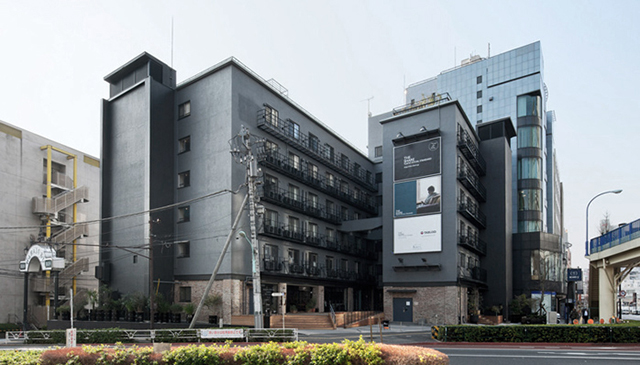 Mikami Junji (28), the manager of ‘The share’, said “Considering that it is located in the central area of the city, the rent is relatively inexpensive compared to the studios in the neighborhood” and “The growing anxiety over living
alone after Tohoku Earthquake is one of the reasons for people to find a share house’. Furthermore, he added “For freelance workers who tend to share time and space more beneficially, here that combines the office and house gives
a great advantage”. That is, the information and personal exchanges are created naturally in a living space, and the synergy among residents could be formed. ‘Social Map’, the service which residents can share information about
the neighborhood, is an example of realizing the crowdsourcing on a share house level. Mikami also introduced other examples that exchanges among residents actually became business.
Mikami Junji (28), the manager of ‘The share’, said “Considering that it is located in the central area of the city, the rent is relatively inexpensive compared to the studios in the neighborhood” and “The growing anxiety over living
alone after Tohoku Earthquake is one of the reasons for people to find a share house’. Furthermore, he added “For freelance workers who tend to share time and space more beneficially, here that combines the office and house gives
a great advantage”. That is, the information and personal exchanges are created naturally in a living space, and the synergy among residents could be formed. ‘Social Map’, the service which residents can share information about
the neighborhood, is an example of realizing the crowdsourcing on a share house level. Mikami also introduced other examples that exchanges among residents actually became business.
 # A in his forties, who is running a company which imports and sells clothes with the main office in a local area, moved into ‘The share’ in 2011 as he expanded his business to Tokyo. While he was reviewing the recruitment of more
employees along with the expansion of the business, he hired one woman in her twenties (worked at the IT consulting company) and two men in their thirties among residents. This could happen because he knew their personalities and
business abilities from their daily lives.
# A photographer in 20’s who made a contract of a share office, a copy writer in 20’s and a web designer in 30’s who are living in the share house carried out a project together. They took pictures of daily lives at ‘The share’,
wrote words for the pictures, and refined the design. ReBITA purchased the products and utilized them to promote their company.
# A in his forties, who is running a company which imports and sells clothes with the main office in a local area, moved into ‘The share’ in 2011 as he expanded his business to Tokyo. While he was reviewing the recruitment of more
employees along with the expansion of the business, he hired one woman in her twenties (worked at the IT consulting company) and two men in their thirties among residents. This could happen because he knew their personalities and
business abilities from their daily lives.
# A photographer in 20’s who made a contract of a share office, a copy writer in 20’s and a web designer in 30’s who are living in the share house carried out a project together. They took pictures of daily lives at ‘The share’,
wrote words for the pictures, and refined the design. ReBITA purchased the products and utilized them to promote their company.
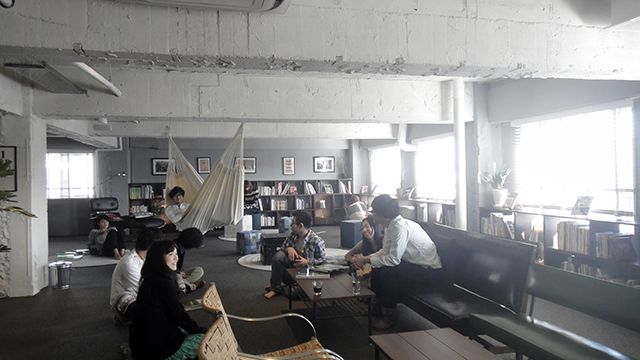 Mikami said “Young people who are working at large companies or as freelance workers have a strong tendency to establish a stepping stone of self-development by sharing various values and information” and “Unlike the bubble generations
in the past, recently young people do not have enough space for networking and spare time while they work hard. Therefore, more than simply sharing a residential area, they want to create the forum of communication and networking
by sharing a space”.
In Korea, a share house became popular around 2012 and 2013. Many of them, however, are still operated mainly for college students, not for office workers, meaning they are more focused on costs than relationship.
[See related articles of a share house in Korea]
Poor Housing Population of the Young reaches 1.4 million “Living under one roof is the breakthrough”
Mikami said “Young people who are working at large companies or as freelance workers have a strong tendency to establish a stepping stone of self-development by sharing various values and information” and “Unlike the bubble generations
in the past, recently young people do not have enough space for networking and spare time while they work hard. Therefore, more than simply sharing a residential area, they want to create the forum of communication and networking
by sharing a space”.
In Korea, a share house became popular around 2012 and 2013. Many of them, however, are still operated mainly for college students, not for office workers, meaning they are more focused on costs than relationship.
[See related articles of a share house in Korea]
Poor Housing Population of the Young reaches 1.4 million “Living under one roof is the breakthrough”
Rent an apartment for $170 a month, Housing Experiment of SNU (Seoul National University)☞Go to the menu
-
Korea
“I once renounced the marriage”
“So exactly how much money can you raise?” Seong-Wook Choi(33) and Young-Eun Seo(31), who have been dating since Jan 1st, 2015, are preparing for marriage but become sensitive when they talk about it. It took forever for the couple, who have been dating upon a tacit premise that they would get married since June, to talk about ‘marriage’, because when Miss. Seo asked about the wedding plan out of stuffy feelings, Mr. Choi gave vague answers.
 Mr.Choi was also uneasy in mind, but avoiding moments like that was the best he could do. Mr. Choi, who has been lived hard in a single-parent family, couldn’t dare to dream about financial support from his mother. Due to his backgrounds,
he has a strong desire for a happy family, but money always catches up with him. He said “If I start saving after repaying my student loan before 30, I think I could make seed money for marriage around 40” and “However, I don’t
think there’s a woman who would understand my situation and wait about 10 years”. Also, he confessed “I think if I go through with marriage despite difficult circumstances, it would be rather unhappy” and “Rather than burying my
life under money and feeling sorry for one’s family who provided the support as a sinner, I thought it would be better to renounce the marriage”.
Renouncing marriage due to economic problems of the youth is not something that started just yesterday, or something only for Mr. Choi. According to the report of Korea Consumer Agency in 2012, 40.4% of men and 19.6% of women answered
that they would not get married because of economic issues.
Mr. Choi said “Although now I have a girlfriend who I want to get married, I’m not in a relationship with her simply because I think I can get married to her”. About the reason he kept putting off the conversation about the marriage,
he said “I couldn’t say because if I confess her honestly that I don’t have even a penny saved, she would leave me”, adding “When I could have a strong belief that she would not leave me although I am penniless, I planned to tell
her like confession”.
Mr.Choi was also uneasy in mind, but avoiding moments like that was the best he could do. Mr. Choi, who has been lived hard in a single-parent family, couldn’t dare to dream about financial support from his mother. Due to his backgrounds,
he has a strong desire for a happy family, but money always catches up with him. He said “If I start saving after repaying my student loan before 30, I think I could make seed money for marriage around 40” and “However, I don’t
think there’s a woman who would understand my situation and wait about 10 years”. Also, he confessed “I think if I go through with marriage despite difficult circumstances, it would be rather unhappy” and “Rather than burying my
life under money and feeling sorry for one’s family who provided the support as a sinner, I thought it would be better to renounce the marriage”.
Renouncing marriage due to economic problems of the youth is not something that started just yesterday, or something only for Mr. Choi. According to the report of Korea Consumer Agency in 2012, 40.4% of men and 19.6% of women answered
that they would not get married because of economic issues.
Mr. Choi said “Although now I have a girlfriend who I want to get married, I’m not in a relationship with her simply because I think I can get married to her”. About the reason he kept putting off the conversation about the marriage,
he said “I couldn’t say because if I confess her honestly that I don’t have even a penny saved, she would leave me”, adding “When I could have a strong belief that she would not leave me although I am penniless, I planned to tell
her like confession”.
Why don’t they have savings?
Mr. Choi answered “I can make about $8,543 through this and that” to the frustration of Miss. Seo two months ago. Miss. Seo said “I have been dating hard wondering ‘How could we be short of money like this?’ but I really didn’t expect it this far”. Why didn’t they who are in their early 30’s have money for preparing marriage and even for dating? Miss. Seo claimed “It’s not because we’ve been lazy”.
 When they met each other first, Mr. Choi was running alternative journalism after quitting his 6-year career as a journalist and Miss. Seo, who had worked as a barista, just came back home after finishing a working holiday life in
Australia. They met as Miss. Seo participated in Mr. Choi’s alternative journalism as a writing staff.
Miss. Seo said “The hourly wage in Australia was about $14.5 so I could still keep changes after having a meal and coffee, but the hourly wage in Korea cannot even afford a meal”, added “Rather than feeling a helplessness like this
and just satisfying a company’s appetite, we wanted to establish the culture or community which everyone could be happy while doing what we want to do”. The talent donation based on local communities was the revenue model for the
alternative journalism. The wall of harsh reality was, however, high for them who started the business with nothing. The seed money had drained, and only debts left.
Miss. Seo said “Since I’ve worked as a barista for 7 years and he has a 6-year career as a journalist, although we had no money at that time, I believed we could repay the debts by saving $1,708 every month and eventually get married”
and “However, in the meantime, we had to spend unexpected medical bills so it was hard to save money as we planned, and as we prepared more for the marriage, we became more discouraged by exorbitant prices”.
When they met each other first, Mr. Choi was running alternative journalism after quitting his 6-year career as a journalist and Miss. Seo, who had worked as a barista, just came back home after finishing a working holiday life in
Australia. They met as Miss. Seo participated in Mr. Choi’s alternative journalism as a writing staff.
Miss. Seo said “The hourly wage in Australia was about $14.5 so I could still keep changes after having a meal and coffee, but the hourly wage in Korea cannot even afford a meal”, added “Rather than feeling a helplessness like this
and just satisfying a company’s appetite, we wanted to establish the culture or community which everyone could be happy while doing what we want to do”. The talent donation based on local communities was the revenue model for the
alternative journalism. The wall of harsh reality was, however, high for them who started the business with nothing. The seed money had drained, and only debts left.
Miss. Seo said “Since I’ve worked as a barista for 7 years and he has a 6-year career as a journalist, although we had no money at that time, I believed we could repay the debts by saving $1,708 every month and eventually get married”
and “However, in the meantime, we had to spend unexpected medical bills so it was hard to save money as we planned, and as we prepared more for the marriage, we became more discouraged by exorbitant prices”.
“Dating and marriage are the processes to identify one’s poverty”
For the question asking the happiest moment in her life, Miss. Seo recalled when she had spaghetti with him after a long time. When they strived to find a path from the alternative journalism, they even thought about the break-up because they had no money, so eating spaghetti was an extravagance for them. The choice of menus depended on its price. They could feel the poverty in their bones when the situations became worse that they even had to cut down on eating. They were indulged in self-pity, intimidated, and sad. Tired of the poverty, they decided to find jobs separately, and it was the first day they ate spaghetti since they started dating. “I ate it after months. I was filled with emotions as we could enjoy meals like this. In the past, it could be a daily routine, but I was so happy that it felt like greeting a new start”. Miss. Seo was about to cry as she recalled the time. In those strange feelings with tears, however, the bitter feeling at the tough reality that they faced again should be included.
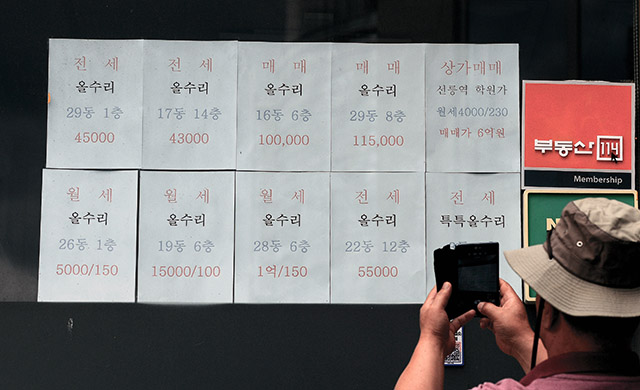 Miss. Seo, who confessed that she was ignorant of the world, said “When seeing my friends who already got married or who are preparing marriage, I thought it was natural to start a newly-married life at the rent house of $341,734
which a groom prepared at his late 20’s”. “I was alarmed when I read an article saying the average rent of a 59㎡ apartment in Seoul was $247,757” and “Looking back, the grooms who prepared the rent house of $341,734 were also just
normal employees, but gold spoons whose parents, executives at large companies, could provide them with capital” said Miss. Seo.
Miss. Seo, who confessed that she was ignorant of the world, said “When seeing my friends who already got married or who are preparing marriage, I thought it was natural to start a newly-married life at the rent house of $341,734
which a groom prepared at his late 20’s”. “I was alarmed when I read an article saying the average rent of a 59㎡ apartment in Seoul was $247,757” and “Looking back, the grooms who prepared the rent house of $341,734 were also just
normal employees, but gold spoons whose parents, executives at large companies, could provide them with capital” said Miss. Seo.
 Based on the ‘report of wedding expenses in 2015’ of 1,000 newly-married couples by Duo Wed, the wedding consulting company, the average house price of married couples in Seoul and capital areas was $154,540. Also, a groom spent
$130,123 on average, while a bride spent $73,190 for wedding expenses.
Mr. Choi felt frustrated by the reality. Furthermore, he spoke from his heart that the economic standard which is rampant in our daily lives is made wrongly. “People think little of changing cars at the price of thousands of dollars,
and consider luxury dates and overseas trips for granted. However, I’m curious that what percentage of Korean people could enjoy all of them while preparing money for marriage by themselves” he said. Also, he added “The lifestyle
is considered as the average life of Koreans already, and my efforts become trivial in the social recognition”. He claimed “I could feel a sense of accomplishment in school days if I tried hard for studying or sports even though
I was living in a single room. However, it is likely to exclude words like ‘efforts’ or ‘a sense of accomplishment’ when it comes to marriage” and “I hope the mood that a couple plan their future by themselves without relying on
the support of parents could be created”.
Based on the ‘report of wedding expenses in 2015’ of 1,000 newly-married couples by Duo Wed, the wedding consulting company, the average house price of married couples in Seoul and capital areas was $154,540. Also, a groom spent
$130,123 on average, while a bride spent $73,190 for wedding expenses.
Mr. Choi felt frustrated by the reality. Furthermore, he spoke from his heart that the economic standard which is rampant in our daily lives is made wrongly. “People think little of changing cars at the price of thousands of dollars,
and consider luxury dates and overseas trips for granted. However, I’m curious that what percentage of Korean people could enjoy all of them while preparing money for marriage by themselves” he said. Also, he added “The lifestyle
is considered as the average life of Koreans already, and my efforts become trivial in the social recognition”. He claimed “I could feel a sense of accomplishment in school days if I tried hard for studying or sports even though
I was living in a single room. However, it is likely to exclude words like ‘efforts’ or ‘a sense of accomplishment’ when it comes to marriage” and “I hope the mood that a couple plan their future by themselves without relying on
the support of parents could be created”.
Still… there’s a hope in communication
Miss. Seo said “Insane social conventions including an apartment bigger than a certain size, furniture at a certain price range, and a car make a number of losers. The only way for the young to deviate from the norm which was set by the old is to have an honest communication about the reality.” “A lot of young people don’t talk about their difficult circumstances because they don’t want to show the inadequate looks. After listening to a story about the couple who are paying back the financial supports from their parents for the wedding after writing a promissory note and getting advice on the specific solutions to receive political benefits, however, I was relieved that the problems in front of me are not only my problems. In order to share the message saying ‘You are not the only one who are in difficult situations and who want to give up. So cheer up’ and establish new social values about the marriage, young generations should be honest with themselves.” Miss. Seo could find happiness after deciding not to compare herself with others if it is unmatchable. Like the moment when she was happy by eating spaghetti, she said “If we could win the bid for a rental house, we can get a bigger house next time by saving money” and “now I can expect I would find happiness in a small accomplishment even if we have different pace with others.” Mr.Choi said he wants to have a ‘small wedding ceremony’ not to be gossiped about. “I don’t want to make my wedding ceremony gloomy because of gossips about the groom and bride” said Mr. Choi, adding “I even thought about holding a wedding ceremony at the tunnel we used to walk together”. He advised “Although people pretend that they are not in the same boat, there’s little difference. I hope young generations who are having a hard time because of the marriage could take a firm stand with their lovers after listening to our story.
☞Go to the menu -
China
“I can live the life of a moonlight clan, because I am a woman”
It is hard to get married in Beijing as much as in Seoul. In particular, men are facing a lot of troubles from an exorbitant house price compared to their wages like Seoul. The house price in comparison with one’s salary is rather high than Seoul, never low. Due to the Chinese marriage culture that a groom bears the whole expenses of a house and marriage, the burdens on men become doubled. Worse yet, women in Beijing who are from local provinces are looking for men from Beijing because of hukou, and it is hard for men to endure that the expectation level for a suitable spouse of women is getting higher as the entry of women in the society becomes more active. (related article: ‘the tragedy of a notion of preferring a son to a daughter… in China, anger of 3.5mil old bachelors are about to explode)
 Wang Fei(assumed name, 31), who I met in Wangjing, called herself a moonlight clan (a word which became popular from the mid 2000’s referring to those who spend all of their monthly incomes without saving). She spends the whole amount
of her monthly income of $1,538 in a month, which is no small money at all. Wang Fei said “There’s no money left after buying clothes, cosmetics, and eating something delicious” and “Most unmarried women is living a life of the
moonlight clan”. The reason why they can enjoy the life of moonlight clan freely is that the notion of “Men take the wedding expenses” is prevalent. Li Wui Lei(26) also said definitely “I save money to prepare for emergency, not
to prepare marriage because women spend little for marriage”.
Tian Fei recently got a loan to buy a house for her 4-year younger brother’s newlywed home, because parents of his girlfriend notified that he must have a house in Beijing while preparing for marriage. To buy a small apartment of
$123,024 in the outskirts of Beijing, his father made a loan of $76,471 while Tian Fei borrowed $45,883. Tian Fei said “We bought a house for a newly married life anyway, but I’m worried that the family of bride would not like
it because it is located in the outskirts of the city” and “I believe that my groom-to-be will buy a house when I get married in the future, so I daringly made a loan”.
Wang Fei(assumed name, 31), who I met in Wangjing, called herself a moonlight clan (a word which became popular from the mid 2000’s referring to those who spend all of their monthly incomes without saving). She spends the whole amount
of her monthly income of $1,538 in a month, which is no small money at all. Wang Fei said “There’s no money left after buying clothes, cosmetics, and eating something delicious” and “Most unmarried women is living a life of the
moonlight clan”. The reason why they can enjoy the life of moonlight clan freely is that the notion of “Men take the wedding expenses” is prevalent. Li Wui Lei(26) also said definitely “I save money to prepare for emergency, not
to prepare marriage because women spend little for marriage”.
Tian Fei recently got a loan to buy a house for her 4-year younger brother’s newlywed home, because parents of his girlfriend notified that he must have a house in Beijing while preparing for marriage. To buy a small apartment of
$123,024 in the outskirts of Beijing, his father made a loan of $76,471 while Tian Fei borrowed $45,883. Tian Fei said “We bought a house for a newly married life anyway, but I’m worried that the family of bride would not like
it because it is located in the outskirts of the city” and “I believe that my groom-to-be will buy a house when I get married in the future, so I daringly made a loan”.
Marriage in Beijing, I tried to prepare it by myself
 Putting what women I met in Beijing said together, it is a wild dream for ordinary men to get married by himself in Beijing. Their salaries fall far short of wedding expenses when the expectation level of women is getting higher
as the phrase ‘Chinese men should have a car and a house to get married’ becomes popular. This is why the new Chinese word ‘Hunbuqi’, which means similar to the word ‘renouncing marriage’ in Korea, was made.
The first hurdle to prepare marriage is to buy a house for the newly-wed life. According to the survey by a wedding information site in China, 72% of women answered that they won’t get married to a man who does not have a house.
In the late 2000’s, a new word ‘Bainu (white-collar slaves) was made while ‘Fangnu’, which refers to the slave of house, takes the top. In 2014, the average price of 80㎡ house in Beijing was $440,476 while the average initial salary
of the graduates of Beijing University was $475.5 based on the research of Beijing University. Therefore, even after applying the wage increase rate, it is impossible to buy a house by saving one’s salary.
Then how much would it cost to prepare the marriage for the middle class in China? I actually checked the price of a house for newly-married couples and wedding halls. Based on the premise that parents of bailinghou generations do
not spare lavish investments in once-in-a-lifetime wedding of their children, I set the bar high.
Putting what women I met in Beijing said together, it is a wild dream for ordinary men to get married by himself in Beijing. Their salaries fall far short of wedding expenses when the expectation level of women is getting higher
as the phrase ‘Chinese men should have a car and a house to get married’ becomes popular. This is why the new Chinese word ‘Hunbuqi’, which means similar to the word ‘renouncing marriage’ in Korea, was made.
The first hurdle to prepare marriage is to buy a house for the newly-wed life. According to the survey by a wedding information site in China, 72% of women answered that they won’t get married to a man who does not have a house.
In the late 2000’s, a new word ‘Bainu (white-collar slaves) was made while ‘Fangnu’, which refers to the slave of house, takes the top. In 2014, the average price of 80㎡ house in Beijing was $440,476 while the average initial salary
of the graduates of Beijing University was $475.5 based on the research of Beijing University. Therefore, even after applying the wage increase rate, it is impossible to buy a house by saving one’s salary.
Then how much would it cost to prepare the marriage for the middle class in China? I actually checked the price of a house for newly-married couples and wedding halls. Based on the premise that parents of bailinghou generations do
not spare lavish investments in once-in-a-lifetime wedding of their children, I set the bar high.
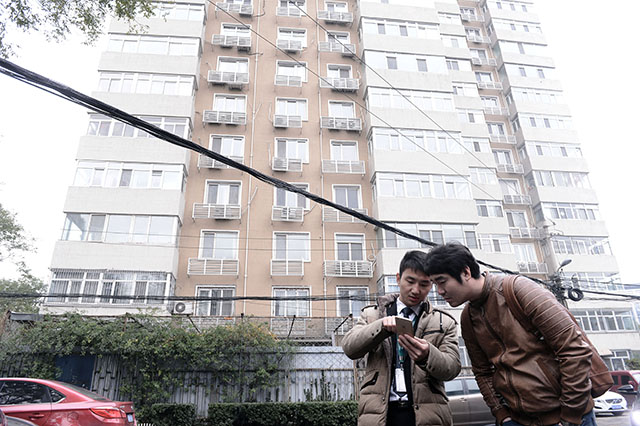 I looked for a house in Haidianqu, a pretty pleasant neighborhood to live in, where has a lot of green areas including parks, major universities are concentrated, and is not far from the office area of Zhongguancun. Wang Hai Tao,
the real estate agent, asked me how long I have live in Beijing, because more than 5 years of residence for those who are from local provinces and 1 year for foreigners are required to buy a house. After I said there’s no problem,
he showed me houses on the market.
Even the monthly rent of a 10㎡ single room was around $459. I told him that I didn’t want to get a room for monthly rent for a newly-wed life, and he showed me studios and apartments on the market. Wang Hai Tao said “Since the neighborhood
is located between ring 3 and ring 4 with good transportation and education environments, the price is relatively high” and “However, as the house price keeps increasing, it is recommendable as an investment”. “In 2014, the price
of small houses was increased by $76,471 while it was increased by $45,882 ~ $61,177 for big houses” he added.
I looked for a house in Haidianqu, a pretty pleasant neighborhood to live in, where has a lot of green areas including parks, major universities are concentrated, and is not far from the office area of Zhongguancun. Wang Hai Tao,
the real estate agent, asked me how long I have live in Beijing, because more than 5 years of residence for those who are from local provinces and 1 year for foreigners are required to buy a house. After I said there’s no problem,
he showed me houses on the market.
Even the monthly rent of a 10㎡ single room was around $459. I told him that I didn’t want to get a room for monthly rent for a newly-wed life, and he showed me studios and apartments on the market. Wang Hai Tao said “Since the neighborhood
is located between ring 3 and ring 4 with good transportation and education environments, the price is relatively high” and “However, as the house price keeps increasing, it is recommendable as an investment”. “In 2014, the price
of small houses was increased by $76,471 while it was increased by $45,882 ~ $61,177 for big houses” he added.
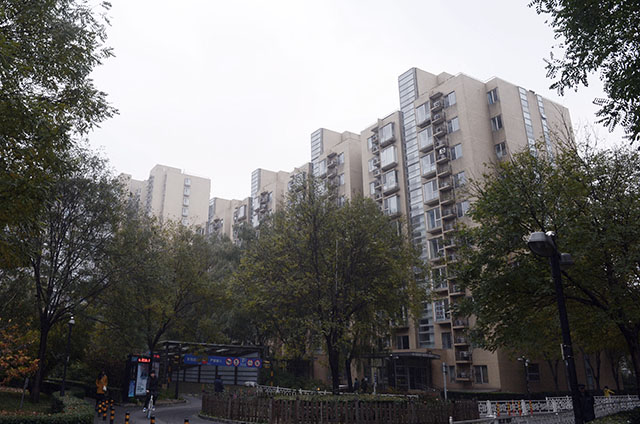 The price range went widely different depending on the year of construction, location, and size, while the asking price of expensive house was around $1,529,432. It was the price range even the luxury apartment in Gangnam, Seoul,
would kill for. The average price of houses on the market in Haidianqu by ㎡ registered at the real estate agency was $7,965. According to the report of KB Kookmin Bank in July, 2014, the average sale price of apartments in Seoul
by ㎡ was $5,238, while the highest price was $9,592 for the apartments in Gangnam-gu. The price range of Haidianqu was between the ranges of Seocho-gu and Yongsan-gu in Seoul.
I actually went to a house to take a look. Wang Tai Hao said that the house was popular among many employees of Agricultural Bank of China Limited and the level of residents in the neighborhood was high. The price of 86㎡ apartment
was $672,950. No matter how hard I checked the apartment, it was much shabbier than apartments in Seoul but still the price was equivalent to the price of apartments in Dogok-dong, Gangnam-gu in Seoul. Wang Hai Tao said “Newly-married
couples prefer apartments as big as 60~70㎡ with two rooms which the price range mostly starts from $611,773” and “If the price is too high, there is also a 59㎡ studio of $535,301”.
The price range went widely different depending on the year of construction, location, and size, while the asking price of expensive house was around $1,529,432. It was the price range even the luxury apartment in Gangnam, Seoul,
would kill for. The average price of houses on the market in Haidianqu by ㎡ registered at the real estate agency was $7,965. According to the report of KB Kookmin Bank in July, 2014, the average sale price of apartments in Seoul
by ㎡ was $5,238, while the highest price was $9,592 for the apartments in Gangnam-gu. The price range of Haidianqu was between the ranges of Seocho-gu and Yongsan-gu in Seoul.
I actually went to a house to take a look. Wang Tai Hao said that the house was popular among many employees of Agricultural Bank of China Limited and the level of residents in the neighborhood was high. The price of 86㎡ apartment
was $672,950. No matter how hard I checked the apartment, it was much shabbier than apartments in Seoul but still the price was equivalent to the price of apartments in Dogok-dong, Gangnam-gu in Seoul. Wang Hai Tao said “Newly-married
couples prefer apartments as big as 60~70㎡ with two rooms which the price range mostly starts from $611,773” and “If the price is too high, there is also a 59㎡ studio of $535,301”.
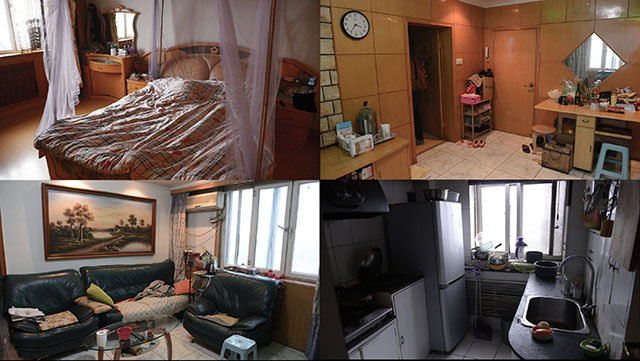 The next is a wedding ceremony. According to the survey of Pinla Wedding Net, the online wedding consulting company, as 67.3% of respondents said ‘My wedding ceremony must be more glamourous than friends’, the desire for a luxury
wedding ceremony was strong. So I looked for luxury hotels in Haidianqu, and chose Empark Grand Hotel which does not charge a venue rental fee but only calculate the sum of meal expenses of guests. The lowest price for 10 people
of one table was $748, but the price of the most popular package was $808. So, if a couple chooses the $808 meal package for 400 guests, the cost for wedding ceremony would be $32,302.
The next is a wedding ceremony. According to the survey of Pinla Wedding Net, the online wedding consulting company, as 67.3% of respondents said ‘My wedding ceremony must be more glamourous than friends’, the desire for a luxury
wedding ceremony was strong. So I looked for luxury hotels in Haidianqu, and chose Empark Grand Hotel which does not charge a venue rental fee but only calculate the sum of meal expenses of guests. The lowest price for 10 people
of one table was $748, but the price of the most popular package was $808. So, if a couple chooses the $808 meal package for 400 guests, the cost for wedding ceremony would be $32,302.
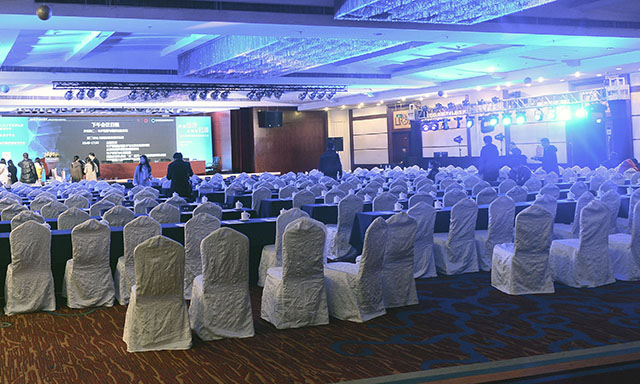 Based on the report about Chinese wedding business development, the wedding expenses of middle-class Chinese people is about $152,943 in total including the engagement ceremony ($50,471), furnishings ($15,294), wedding gifts ($19,883),
wedding photos ($3,059), and others. By adding $611,773 for a house, $32,118 for a wedding ceremony, and $3,059 for honeymoon on that, it costs $799,893 to get married in Beijing.
☞Go to the menu
Based on the report about Chinese wedding business development, the wedding expenses of middle-class Chinese people is about $152,943 in total including the engagement ceremony ($50,471), furnishings ($15,294), wedding gifts ($19,883),
wedding photos ($3,059), and others. By adding $611,773 for a house, $32,118 for a wedding ceremony, and $3,059 for honeymoon on that, it costs $799,893 to get married in Beijing.
☞Go to the menu -
Japan
Konkatsu, women looking for a ‘housewife job’
If we approach the marriage issue in Korea and Chine on the perspective of men, we could take a perspective of women when it comes to Japan, because, as we went through in advance, Japanese men advance into society at the relatively young age so that they could establish an economic foundation in their 30’s, the marriageable age.
 For the ‘Wakamono theory’ that collectively deals with the youth problems in Japan, women always have been out of question because it is nothing new that, unlike men, there are many women who are temporary workers and living with
their parents. According to the census of the Ministry of International Affairs and Communication, in 2010, 13.2% of male population and 41.6% of female population at the age of 25~34 were temporary workers. In 1990, the figure
was 3.2% and 28.2% respectively. When looking at the figures of population at the age of 35~44, the ratio of temporary workers for men and women shows a clear difference with the figures of 3.3% and 49.7% respectively. That is,
unlike men, the ratio of Japanese women who are working as temporary workers has been constantly high in all ages.
Marriage has become a social issue since the late 2000’s when the income dropped sharply as the parents’ generation with children in their 30’s went into retirement. In other words, parents cannot support their parasite single children
who are not economically independent anymore. As the economic power of parents became weakened, young female non-regular workers needed somebody to rely on, and the marriage was an alternative. They were pushed into looking for
a spouse by parents, not from the desire of themselves,
For the ‘Wakamono theory’ that collectively deals with the youth problems in Japan, women always have been out of question because it is nothing new that, unlike men, there are many women who are temporary workers and living with
their parents. According to the census of the Ministry of International Affairs and Communication, in 2010, 13.2% of male population and 41.6% of female population at the age of 25~34 were temporary workers. In 1990, the figure
was 3.2% and 28.2% respectively. When looking at the figures of population at the age of 35~44, the ratio of temporary workers for men and women shows a clear difference with the figures of 3.3% and 49.7% respectively. That is,
unlike men, the ratio of Japanese women who are working as temporary workers has been constantly high in all ages.
Marriage has become a social issue since the late 2000’s when the income dropped sharply as the parents’ generation with children in their 30’s went into retirement. In other words, parents cannot support their parasite single children
who are not economically independent anymore. As the economic power of parents became weakened, young female non-regular workers needed somebody to rely on, and the marriage was an alternative. They were pushed into looking for
a spouse by parents, not from the desire of themselves,
The term‘konkatsu’, which can be interpreted as ‘marriage activities’, became rapidly popular after the book titled ‘The age of konkatsu’ was published. The book delivers the message that you have to try actively to get married, and this could be the result reflecting the desire of parents’ generation. Actually, young people in Japan made little efforts to get married as 63.7% of unmarried respondents answered ‘I don’t have a date’ for the survey of 10,000 people in their 20’s~30’s conducted by the Cabinet Office in 2011. Whether someone made single women in Japan do it or they did it on their own, the marriage has emerged as an alternative to transform the life of parasite single woman. However, this rather acts as a device that instills the value of ‘marriage instead of employment’ among young women. The research of the Cabinet Office backed up this idea. According to the research, 44% of women in their 20s answered ‘A wife should take care of households’, and the figure is increased by 16% from 3 years ago. Professor Fukushima Minori at Dokoha University claimed “The number of women in their 20s and 30s including college students who want to be a housewife is increasing” and “This phenomenon reflects that the gendered survival strategy of parents’ generation, ‘Workaholic husband’ and ‘Housewife’, is emerging again.
Two things hidden behind konkatsu, ‘poverty’ and ‘relationship’
The economic system of Japan was maintained for men to support women. This stemmed from a deep-rooted value that men should earn a living while women should take care of households and childrearing. There was no problem with the system before ‘The lost two decades’ but as Japanese men, whose economic position became weakened, do not consider marriage as a choice, not a must, the values about traditional gender roles in Japan has led to a social issue. The marriage, which was one of the methods of survival for women, should be substituted by the life relying on their parents while women who don’t have parents to economically turn to are at a crossroads of survival. The article reported by Asahi Newspaper in 2011 titled ‘Single women, 1 out of 3 is poor’ and the NHK’s documentary program broadcasted in 2014 ‘There’s no tomorrow – The poverty of young women becomes serious’ are about the seriousness of female poverty. The income of single women has rather decreased compared to many years ago, and the tough life of them became gradually known under the name of ‘Girls poor’. The problem has always existed but it stood out as the unmarried rate went up.
 Professor Dakenobu Mieko at Wakodae University, a former journalist, analyzed ‘konkatsu’ in the article, published in the September edition, 2013 of ‘Modern Thoughts’, as written below.
“In Japan, where men and women are not economically equal, there’s no place for women to enter while even the employment circumstances for men becomes worsened. In the end, women cannot help finding a man. It’s not about ‘Should
I marry or not’, but ‘Can I get married or not’. There are few options for a living except marriage, but the number of men available has dropped sharply. As a result, the wall against the marriage becomes very high, so the desperate
konkatsu was born to overcome the hurdles of getting married.”
If the poverty is the first keyword that was hidden behind konkatsu, the second one is the relationship. After Dohoku Earthquake in 2011, the value of family is visibly mentioned a lot in Japan. The media asks for a change of Japanese
society that becomes personalized by emphasizing ‘the bond of a family’. Also, the term ‘Earthquake-marriage’ became popular which was mentioned in the book which was published in 2011 by a journalist, Shirakawa Momoko. The term
means that single people, who were passive in marriage, start actions to get married with the earthquake as a momentum. It shows their will to overcome the fear of being alone by creating relationship.
Professor Dakenobu Mieko at Wakodae University, a former journalist, analyzed ‘konkatsu’ in the article, published in the September edition, 2013 of ‘Modern Thoughts’, as written below.
“In Japan, where men and women are not economically equal, there’s no place for women to enter while even the employment circumstances for men becomes worsened. In the end, women cannot help finding a man. It’s not about ‘Should
I marry or not’, but ‘Can I get married or not’. There are few options for a living except marriage, but the number of men available has dropped sharply. As a result, the wall against the marriage becomes very high, so the desperate
konkatsu was born to overcome the hurdles of getting married.”
If the poverty is the first keyword that was hidden behind konkatsu, the second one is the relationship. After Dohoku Earthquake in 2011, the value of family is visibly mentioned a lot in Japan. The media asks for a change of Japanese
society that becomes personalized by emphasizing ‘the bond of a family’. Also, the term ‘Earthquake-marriage’ became popular which was mentioned in the book which was published in 2011 by a journalist, Shirakawa Momoko. The term
means that single people, who were passive in marriage, start actions to get married with the earthquake as a momentum. It shows their will to overcome the fear of being alone by creating relationship.
 However, things don’t always go your way although you set your mind. The phenomenon that a number of young people in Japan express difficulties in relationship applies to the relationships with opposite sex, a marriage partner, as well. On many Japanese
drama about konkatsu, a couple who met by a matchmaking company keep seeing each other for marriage only based on qualifications without mutual understanding or love. Also, when a couple has problems for dating, they try to find
solutions from private lessons of consultants, rather than communicating with each other. The cause and solution of the problem converge into the personal issue, not relationship. In some ways, konkatsu is a subject which the society
has brought to recover the disconnected relationship of young people in Japan.
☞Go to menu
However, things don’t always go your way although you set your mind. The phenomenon that a number of young people in Japan express difficulties in relationship applies to the relationships with opposite sex, a marriage partner, as well. On many Japanese
drama about konkatsu, a couple who met by a matchmaking company keep seeing each other for marriage only based on qualifications without mutual understanding or love. Also, when a couple has problems for dating, they try to find
solutions from private lessons of consultants, rather than communicating with each other. The cause and solution of the problem converge into the personal issue, not relationship. In some ways, konkatsu is a subject which the society
has brought to recover the disconnected relationship of young people in Japan.
☞Go to menu
-
Japan
Dreaming a new leap inside the relationship
The documentary of NHK titled ‘the society with no relationship’ which was broadcasted in 2010 took a lot of attention by showing shocking examples of dying alone. It aroused the necessity of the restoration of relationship in the completely isolated reality that even the blood ties were collapsed. Not only with the dying alone issue, the shadow of the society with no relationship is flowing all over Japan. In Marunouchi, Chiyoda, the representative office district in Tokyo, it is easy to see peopl who eat alone outside like on a park bench during lunch time. This is what attracts public attention as a new social phenomenon under the name of ‘Honbap (eating alone) in Korea, but it is common in everyday life in Japan from the desire to enjoy free time out of the stress of relationship even only for lunch time. As a lot of young people chose the fatigue from relationship as the reason to quit their job along with excessive workloads, the relationship stress in Japanese society has reached a serious level.
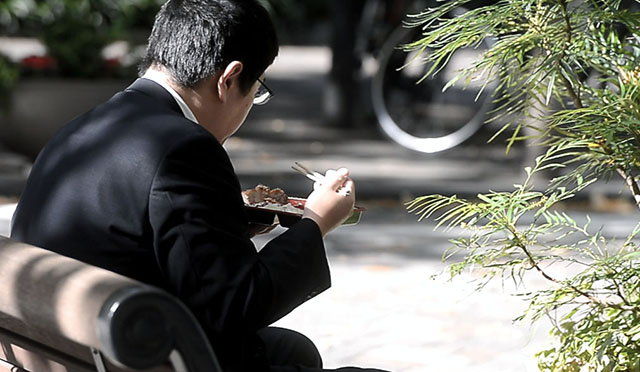 Among young people, however, we can see a lot of examples about who are rather dreaming about a new leap through relationship. Instead, it is notable that the relationship they are pursuing is not the inflexible relationship which
can be seen in the traditional organization culture, but the relationship which aims at coexistence.
Syuutomo café in Shinjuki, Tokyo, was opened to the effect of sealing the gaps of employment between students in Tokyo and from local areas. Dakeda Yoko, the manager of the café, said “Most
people prepare employment alone” and “we made the name by combining the word ‘Syuu’ of employment and ‘tomodachi’ which means friends under the idea that it would be more efficient and fun if we prepare employment with friends
together by exchanging information”. One of the advantages of Syuutomo café is that people can gather and practice simulated job interviews or discussions naturally which are not familiar to students from local provinces. Students
from Aomori and Miyagi were preparing a job interview on the day I visited as well. Dakeda said “During the interview seasons, around 60~70 students are gathered here” and “they naturally form a group, and practice interviews and
discussions without any instruction”.
Among young people, however, we can see a lot of examples about who are rather dreaming about a new leap through relationship. Instead, it is notable that the relationship they are pursuing is not the inflexible relationship which
can be seen in the traditional organization culture, but the relationship which aims at coexistence.
Syuutomo café in Shinjuki, Tokyo, was opened to the effect of sealing the gaps of employment between students in Tokyo and from local areas. Dakeda Yoko, the manager of the café, said “Most
people prepare employment alone” and “we made the name by combining the word ‘Syuu’ of employment and ‘tomodachi’ which means friends under the idea that it would be more efficient and fun if we prepare employment with friends
together by exchanging information”. One of the advantages of Syuutomo café is that people can gather and practice simulated job interviews or discussions naturally which are not familiar to students from local provinces. Students
from Aomori and Miyagi were preparing a job interview on the day I visited as well. Dakeda said “During the interview seasons, around 60~70 students are gathered here” and “they naturally form a group, and practice interviews and
discussions without any instruction”.
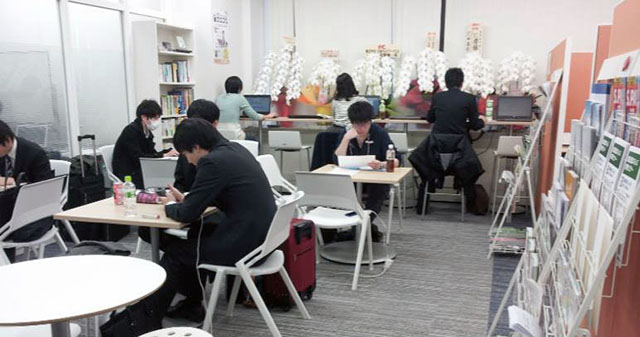
The power of relationship that changed NEET
After 2004, NEET (young people who are Not in Education, Employment or Training at the age of 15~34) suddenly stood out as a social problem in Japan. At that time, most people considered NEET as ‘a lazy young man who does not have will to work due to spoiled life’ without discussing poverty and social exclusion issues. However, most of NEET people were excluded from the labor market due to the absence of abilities rather than laziness (young people who have physical limitations including illness and disability or whose education level is low from low-income families) or from the society because of human relationship troubles. In particular, about a half of NEET people has experienced problems in relationships like bullying. Young generations I met in Yokohama, Kanagawa, could go back to the society, after years of living a life of NEET, by building a new relationship with the assistance of NPO.
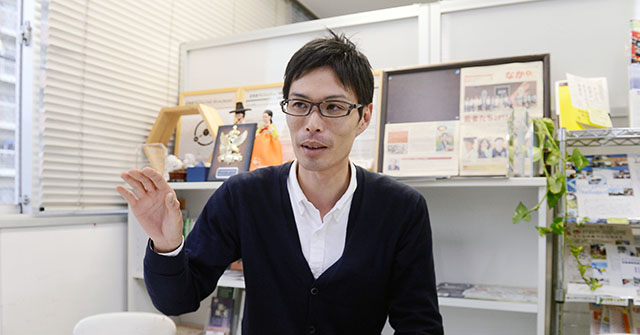 Dakaoka Yoshitaka(35) escaped the life of hikikomori with 3ㆍ11 Dohoku Earthquake as a momentum. Dakaoka, who had worked as a cooking assistance at a Chinese restaurant for 5 years after graduating the department of economics and
business administration at Wako University, quit the job as the relationship with colleagues grew apart. He said “I thought about getting a job after that, but since I didn’t have financial problems thanks to the support of parents
and there was no specific work I wanted to do, I had lived a life of NEET” and “as I shut down conversation with parents as time went by, I had lived life of hikikomori”. When he had been a hikikomori person for 3 years, Dakaoka
felt the anxiety and loneliness about the future, but he could not have courage to enter the society again.
When Dohoku Earthquake occurred as well, Dakaoka was watching TV vacantly. He said he couldn’t believe that what he looked in TV was real. To see the terrible damages after the earthquake, he felt an inclination to do anything. Under
the thought “What am I doing when there are so many people in need?”, he participated in a week voluntary camp, and the experience had changed his life 180 degrees.
Dakaoka Yoshitaka(35) escaped the life of hikikomori with 3ㆍ11 Dohoku Earthquake as a momentum. Dakaoka, who had worked as a cooking assistance at a Chinese restaurant for 5 years after graduating the department of economics and
business administration at Wako University, quit the job as the relationship with colleagues grew apart. He said “I thought about getting a job after that, but since I didn’t have financial problems thanks to the support of parents
and there was no specific work I wanted to do, I had lived a life of NEET” and “as I shut down conversation with parents as time went by, I had lived life of hikikomori”. When he had been a hikikomori person for 3 years, Dakaoka
felt the anxiety and loneliness about the future, but he could not have courage to enter the society again.
When Dohoku Earthquake occurred as well, Dakaoka was watching TV vacantly. He said he couldn’t believe that what he looked in TV was real. To see the terrible damages after the earthquake, he felt an inclination to do anything. Under
the thought “What am I doing when there are so many people in need?”, he participated in a week voluntary camp, and the experience had changed his life 180 degrees.
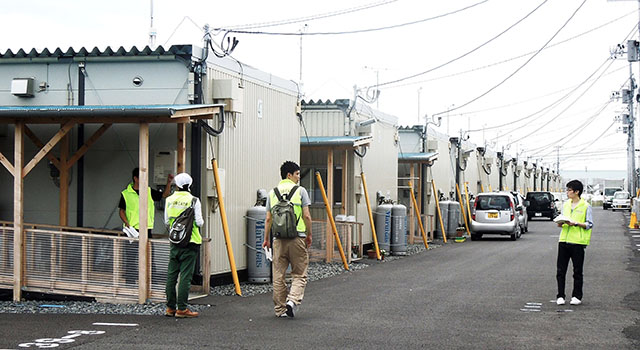 Dakaoka said “When I met the residents in damaged areas, they said ‘let’s build a better town’ instead of ‘Let’s restore the town to the original condition’” and “I was shocked to see people who were positively dreaming rosy future”.
Also, he added “I was familiar with taking when living as a hikikomori, but could feel the happiness when giving help to somebody through voluntary services” and “this gave me confidence that I could live as a full-fledged worker
in the society too”.
Dakaoka said “When I met the residents in damaged areas, they said ‘let’s build a better town’ instead of ‘Let’s restore the town to the original condition’” and “I was shocked to see people who were positively dreaming rosy future”.
Also, he added “I was familiar with taking when living as a hikikomori, but could feel the happiness when giving help to somebody through voluntary services” and “this gave me confidence that I could live as a full-fledged worker
in the society too”.
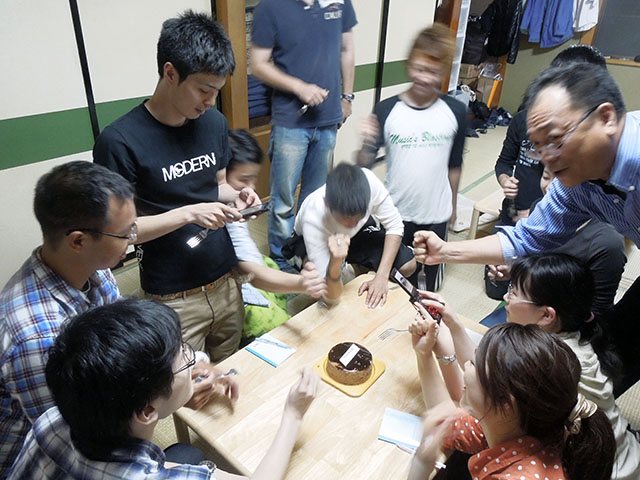 Additionally, he made an unforgettable memory during the voluntary service. He, who had never celebrated his birthday since his 20’s, said “My birthday was in the voluntary service periods, so local residents and co-workers had a
small party for me” and “I’ve never felt happiness from communicating or being with others since my childhood, but I could realize that it is really happy to share pleasure with somebody together”. Only a week experience of voluntary
service has led him to the social enterprise, and now he is working as a staff member supporting the damaged areas from earthquakes. Relationship has achieved a small miracle.
Mita Kunihiki(33) had lived as NEET after graduating high school in 2000 while giving up entering a university or getting a job. Mita said “While I had lived as NEET for 10 years, the period I earned money is only 3-month” and “I
could not find interest in anything”. What made Mita go back to the society were a firm response of her parents and the system which helped her in adjusting to the society. As her parents said “leave the house before you become
30”, she searched online and found the social enterprise, K2 International that supports NEET and Hikikomori to be self-sufficient. Mita registered the self-sufficient program in 2010 and had
worked at a Takoyaki store while coming and going between Japan and Sydney, Australia. Of course, the program was operated by the government funds, and it didn’t cost her anything.
Additionally, he made an unforgettable memory during the voluntary service. He, who had never celebrated his birthday since his 20’s, said “My birthday was in the voluntary service periods, so local residents and co-workers had a
small party for me” and “I’ve never felt happiness from communicating or being with others since my childhood, but I could realize that it is really happy to share pleasure with somebody together”. Only a week experience of voluntary
service has led him to the social enterprise, and now he is working as a staff member supporting the damaged areas from earthquakes. Relationship has achieved a small miracle.
Mita Kunihiki(33) had lived as NEET after graduating high school in 2000 while giving up entering a university or getting a job. Mita said “While I had lived as NEET for 10 years, the period I earned money is only 3-month” and “I
could not find interest in anything”. What made Mita go back to the society were a firm response of her parents and the system which helped her in adjusting to the society. As her parents said “leave the house before you become
30”, she searched online and found the social enterprise, K2 International that supports NEET and Hikikomori to be self-sufficient. Mita registered the self-sufficient program in 2010 and had
worked at a Takoyaki store while coming and going between Japan and Sydney, Australia. Of course, the program was operated by the government funds, and it didn’t cost her anything.
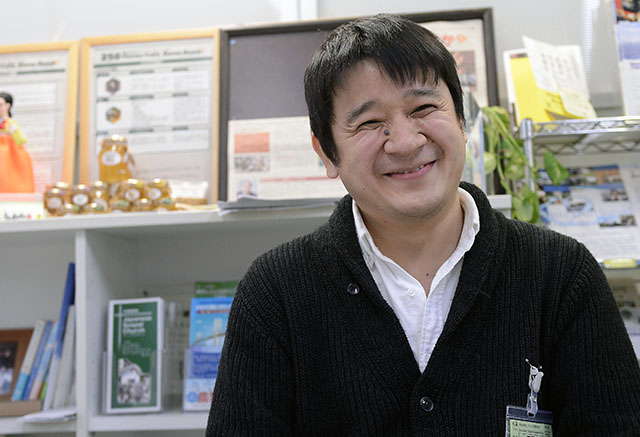 Now, she is working as a decent junior manager at a Takoyaki store run by K2 International with a monthly income of $1,662. Mita said “If there was no such program of K2 International, it could not be easy to escape from the life
of NEET” and “I am now living in a dormitory with my colleagues, and my life, working and living with them, is happy and satisfactory”.
Now, she is working as a decent junior manager at a Takoyaki store run by K2 International with a monthly income of $1,662. Mita said “If there was no such program of K2 International, it could not be easy to escape from the life
of NEET” and “I am now living in a dormitory with my colleagues, and my life, working and living with them, is happy and satisfactory”.
Relationship, water for the dry society
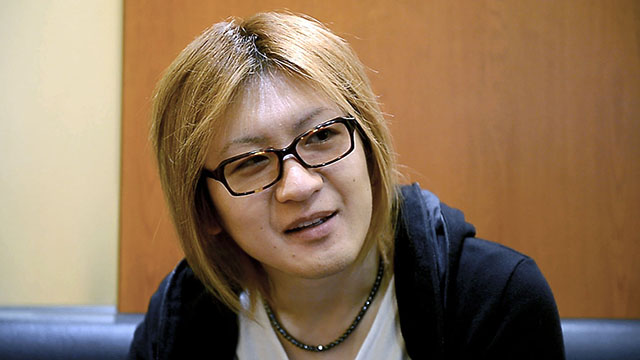 “I was wondering what kind of people would apply if I adopt the recruitment system of working-3-days-a-week for $1,245. It generated a social sensation, however, as many highly educated people had applied unexpectedly.”
Wakashin Yujun, a project researcher at the media graduate school of Keio University, Japan, is carrying out various experimental employment projects to let the Japanese society embrace different ways of thinking and life attitudes
based on the idea that inflexible organization culture of Japan makes a lot of young people fall behind and the relationship heartless.
Other than ‘bstyle employment (loose recruitment)’ of less-work-less-income, 203 people had applied for ‘Betsuroute’ (After an applicant checks the company where
he/she does not want to enter, he/she can start working as an intern at the most suitable company identified based on birthday and other information). Among them, a number of highly educated people were included including 10 from
Waseda University, 6 from Meiji University, 4 from Tokyo University and Osaka University respectively, and 3 from Kyoto University. Also, ‘Narcissist employment (the employment system that does
not educate maniacs on the organization culture, but let them be as they are)’ was also popular for those who have high education levels.
Wakashin said “Japan becomes the country where you can live an affluent life even though you are not especially rich” and “Now is the time for young generations to think about how they can live a life worth living more than just
living”. That is “more and more people consider the balance of work and life as important”.
The Japanese society is, however, so inflexible that it cannot accept their ways of thinking. He said “The society in Japan itself is rich but doesn’t have a wide range of choices”. For example, people get employed in the system
set by the society, and they should be loyal to the company even without appropriate compensation. They cannot be late and attract other’s notice. If one cannot satisfy these criteria, he is branded as a troublemaker.
Therefore, it naturally breaks one’s desire. Wakashin analyzed that Japanese young people work to score 60 because they won’t get rewards for better scores but scolded for lower scores.
“I was wondering what kind of people would apply if I adopt the recruitment system of working-3-days-a-week for $1,245. It generated a social sensation, however, as many highly educated people had applied unexpectedly.”
Wakashin Yujun, a project researcher at the media graduate school of Keio University, Japan, is carrying out various experimental employment projects to let the Japanese society embrace different ways of thinking and life attitudes
based on the idea that inflexible organization culture of Japan makes a lot of young people fall behind and the relationship heartless.
Other than ‘bstyle employment (loose recruitment)’ of less-work-less-income, 203 people had applied for ‘Betsuroute’ (After an applicant checks the company where
he/she does not want to enter, he/she can start working as an intern at the most suitable company identified based on birthday and other information). Among them, a number of highly educated people were included including 10 from
Waseda University, 6 from Meiji University, 4 from Tokyo University and Osaka University respectively, and 3 from Kyoto University. Also, ‘Narcissist employment (the employment system that does
not educate maniacs on the organization culture, but let them be as they are)’ was also popular for those who have high education levels.
Wakashin said “Japan becomes the country where you can live an affluent life even though you are not especially rich” and “Now is the time for young generations to think about how they can live a life worth living more than just
living”. That is “more and more people consider the balance of work and life as important”.
The Japanese society is, however, so inflexible that it cannot accept their ways of thinking. He said “The society in Japan itself is rich but doesn’t have a wide range of choices”. For example, people get employed in the system
set by the society, and they should be loyal to the company even without appropriate compensation. They cannot be late and attract other’s notice. If one cannot satisfy these criteria, he is branded as a troublemaker.
Therefore, it naturally breaks one’s desire. Wakashin analyzed that Japanese young people work to score 60 because they won’t get rewards for better scores but scolded for lower scores.
 Wakashin said that the goal of his project is to make the society more flexible. He believes that the society would become much better when it accept the diversity of individuals as it is.
He gathered 150 NEET people online and established ‘NEET Co. Ltd’ where all of them are equally working as directors in a way of providing a forum for them to gather ideas and develop creative business
by themselves. He was curious what would happen if NEET people, who others look down on, make relationship in their own ways, which is not set by the society, and motivate themselves.
They onlly made profits of $7,639 in 2014 but the media paid attention to the union itself. Naka Yosuke(26), the current president of NEET Co. Ltd, said “Personal abilities and creativeness of those who are working at NEET Co. Ltd
don’t fall behind regular workers” and “Since obeying orders is important in normal companies, NEET people didn’t get a job, because it’s not the lifestyle they want to have”. About NEET Co. Ltd, he said “Although the profit is
small, it is good to work with people who accept the new employment methods and business types”, adding “I want to prove that NEET can generate good results if gathered, and gain recognition from the society”.
The intention of Wakashin hit the target with the examples of Naka. By embracing the diversity of NEET people who are against the standardized employment system, he certainly motivated those who had no will.
Wakashin diagnosed that the present Japanese society is in a warm but dry condition, and said “Embracing the diversity and expanding positive relationship will give water to make the dry society moist”.
☞Go to menu
Wakashin said that the goal of his project is to make the society more flexible. He believes that the society would become much better when it accept the diversity of individuals as it is.
He gathered 150 NEET people online and established ‘NEET Co. Ltd’ where all of them are equally working as directors in a way of providing a forum for them to gather ideas and develop creative business
by themselves. He was curious what would happen if NEET people, who others look down on, make relationship in their own ways, which is not set by the society, and motivate themselves.
They onlly made profits of $7,639 in 2014 but the media paid attention to the union itself. Naka Yosuke(26), the current president of NEET Co. Ltd, said “Personal abilities and creativeness of those who are working at NEET Co. Ltd
don’t fall behind regular workers” and “Since obeying orders is important in normal companies, NEET people didn’t get a job, because it’s not the lifestyle they want to have”. About NEET Co. Ltd, he said “Although the profit is
small, it is good to work with people who accept the new employment methods and business types”, adding “I want to prove that NEET can generate good results if gathered, and gain recognition from the society”.
The intention of Wakashin hit the target with the examples of Naka. By embracing the diversity of NEET people who are against the standardized employment system, he certainly motivated those who had no will.
Wakashin diagnosed that the present Japanese society is in a warm but dry condition, and said “Embracing the diversity and expanding positive relationship will give water to make the dry society moist”.
☞Go to menu
-
China
Launching business sprang up on the soil of cooperation
“Are you coming for an interview? CCTV of China is shooting all day long now. Ah~ they are not entrepreneurs but middle school students for the site visit. After spending time to see this and that and ask question, now they are gathering ideas by themselves.” Helen Liu, the employee of Cheku café, naturally introduced the ambience as if she is familiar with foreign reporters. Cheku café, located in the business district of Zhongguancun, Haidianqu in Beijing, was full of energy. People who came by twos and threes talked ceaselessly, and reporters were jumbled. It was so noisy that even a market street could not be comparable.
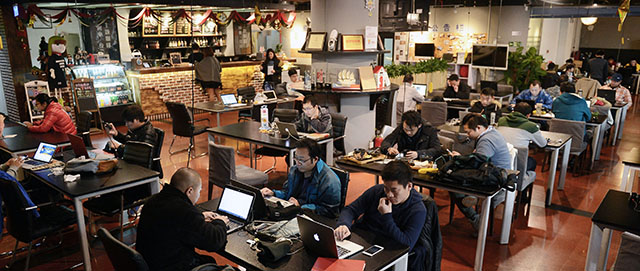 Cheku café, which named after that Steve Jobs launched Apple in his garage, was opened in 2011. At first, the café was almost a co-working space where founders could share ideas and cooperate, but as it took the role of private incubator
to arrange meetings with investors, it became the most popular business café.
At Cheku café, there’s a usual but special event held at 1:30 p.m. everyday. Founders can talk about their business items or have a presentation about the progress.
Nan Chung Hui(26) introduced his ‘complimentary account management program for application developers’. When Nam Chung Hui came back to the seat after the presentation, six to seven people gathered around him to ask him questions
like ‘What is the principle?’, ‘If it is a complimentary program, how can you make profits?’, and ‘I want to apply the program as an app developer’ or to exchange opinions.
Cheku café, which named after that Steve Jobs launched Apple in his garage, was opened in 2011. At first, the café was almost a co-working space where founders could share ideas and cooperate, but as it took the role of private incubator
to arrange meetings with investors, it became the most popular business café.
At Cheku café, there’s a usual but special event held at 1:30 p.m. everyday. Founders can talk about their business items or have a presentation about the progress.
Nan Chung Hui(26) introduced his ‘complimentary account management program for application developers’. When Nam Chung Hui came back to the seat after the presentation, six to seven people gathered around him to ask him questions
like ‘What is the principle?’, ‘If it is a complimentary program, how can you make profits?’, and ‘I want to apply the program as an app developer’ or to exchange opinions.
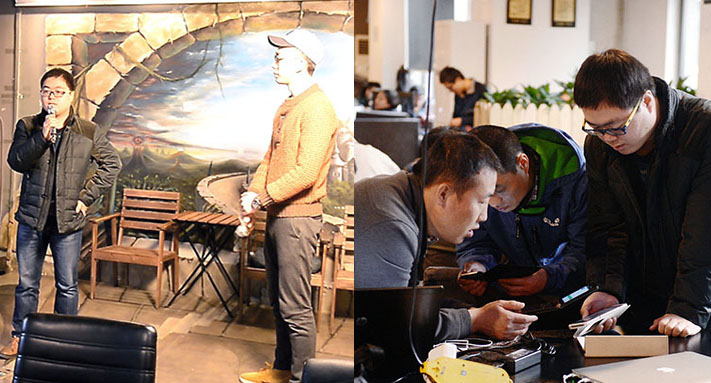 Gathering is more active after presentation, but the scene is nothing new. Ye-Ji Cheon(27), a Korean woman who I met at Cheku café, acknowledged me first as if she was glad to hear Koreans in a foreign country. She said “My goal
is to establish a community café in which Asian people can communicate with freely” and “I am here to find a Chinese friend who is willing to do that with me”. Then she said she was amazed by the active communication of founders
at there, because it is almost tiresome that everyone is asking ‘Are you preparing to launch business?’ and ‘Wheat is your business item?. Miss. Cheon said “The experience at Cheku café is very special” and “I cannot forget people
here easily who are active to cooperate and exchange ideas, not caring about their gains” showing her two thumbs up.
Gathering is more active after presentation, but the scene is nothing new. Ye-Ji Cheon(27), a Korean woman who I met at Cheku café, acknowledged me first as if she was glad to hear Koreans in a foreign country. She said “My goal
is to establish a community café in which Asian people can communicate with freely” and “I am here to find a Chinese friend who is willing to do that with me”. Then she said she was amazed by the active communication of founders
at there, because it is almost tiresome that everyone is asking ‘Are you preparing to launch business?’ and ‘Wheat is your business item?. Miss. Cheon said “The experience at Cheku café is very special” and “I cannot forget people
here easily who are active to cooperate and exchange ideas, not caring about their gains” showing her two thumbs up.
Founders, met at the garage
Nan Chung Hui from Shanxi majored in English literature at the university said “I came here as I had become interested in the application of online lessons while I was working as an English instructor”. Also, he said “I gained confidence when I heard Jack Ma also majored in English when I decided to launch business” and “I believe I can accomplish my goal as well when I see companies that made rapid growths on the back of economic developments of China including Alibaba and Tencent”.
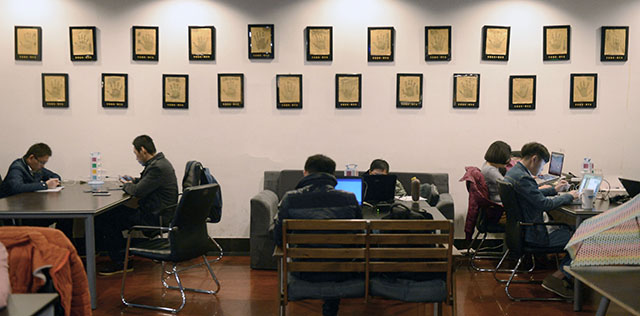 He never forgot to mention the advantages of Cheku café. Nan Chung Hui said “It is easy to understand the situation since founders are gathering here, so I can feel what I need to plan my business in the future” and “the reason why
Xiaomi could succeed is that they correctly grasped the needs of the market”. He confessed his ambitions that he will make success applying advantageous lessons he learned at Cheku café.
Wang Xu Ge(27) started developing application after working 2 years at a company after graduating the department of computer engineering at Beijing University of Technology. His business item is ‘Smart Cabinet’ which connects the
storage box of deliveries with a smart phone. Wang Xu Ge said “Since there are many people who are planning business that connects our daily lives via apps like me, I could get a lot of help from communication” and “Also I can
feel the burning passion of founders who are coming here, so I can brace my energies as well”. He added “Although now I do not make any profit and the progress has been slow, since the business item has great potential, I am confident
to do a good job”.
He never forgot to mention the advantages of Cheku café. Nan Chung Hui said “It is easy to understand the situation since founders are gathering here, so I can feel what I need to plan my business in the future” and “the reason why
Xiaomi could succeed is that they correctly grasped the needs of the market”. He confessed his ambitions that he will make success applying advantageous lessons he learned at Cheku café.
Wang Xu Ge(27) started developing application after working 2 years at a company after graduating the department of computer engineering at Beijing University of Technology. His business item is ‘Smart Cabinet’ which connects the
storage box of deliveries with a smart phone. Wang Xu Ge said “Since there are many people who are planning business that connects our daily lives via apps like me, I could get a lot of help from communication” and “Also I can
feel the burning passion of founders who are coming here, so I can brace my energies as well”. He added “Although now I do not make any profit and the progress has been slow, since the business item has great potential, I am confident
to do a good job”.
Beyond ‘An individual should seek his own way of survival’ …
Zhongguancun, the Silicon Valley of China, is home to twenty thousands of research centers and companies. The total amount of market cap of companies, that had launched business in Zhongguancun and are listed on major global stock markets, was almost $315 billion as of the late 2013, a colossal amount of money which is equivalent to the annual budget of Korea. The reason why Zhongguancun could be the mecca of launching business is, as can be seen from the case of Cheku, the win-win system by cooperation, out of the competition that individuals should seek their own ways of survival. The ‘cooperation system’ applies just the same to junior entrepreneurs who are not rookies anymore as well. They could have learned by experience that they can do well, when others do well, not when they win over others. There are large buildings with banners ‘SOHO (small office home office)’ in every main area of Beijing. SOHO building that combines the office and commercial facilities started only a few years ago. SOHO, that directly shows the launching business boom in China, provides a good point of contact for founders to meet consumers and investors. There’s also SOHO in Sanlitun, Chaoyang, the most popular area for young people in Beijing. The monthly rent for the office in SOHO in Sanlitun is $$458~$610, little more expensive than normal offices, but companies in the building are fully enjoying direct effects including close contact with young consumers.
 Zhang Xi Bin(30), who has been running his own business for 6 years, is operating a job company that connects programmers to companies. Initially, he constructed the online system of a company by himself, but had a problem with a
manpower supply as the demands increased. Therefore, he decided to rather open a head-hunting company to connect the demands and manpower in 2014.
For the reason why he opened the office at SOHO, Sanlitun, Zhang Xi Bin explained “Since many small companies like us are located in SOHO, it is easy to have communication or cooperation” and “Also, it is advantageous for investment
and promotions because here is where many media give their attention to and investors visit often.”
Zhang Xi Bin(30), who has been running his own business for 6 years, is operating a job company that connects programmers to companies. Initially, he constructed the online system of a company by himself, but had a problem with a
manpower supply as the demands increased. Therefore, he decided to rather open a head-hunting company to connect the demands and manpower in 2014.
For the reason why he opened the office at SOHO, Sanlitun, Zhang Xi Bin explained “Since many small companies like us are located in SOHO, it is easy to have communication or cooperation” and “Also, it is advantageous for investment
and promotions because here is where many media give their attention to and investors visit often.”
 From the failure of launching business when he was a college student, he became keenly aware of the necessity of cooperation. Zhang Xi Bin said “When online shopping sites became popular including Alibaba and Taobao, I opened a similar
website but failed in the end” and “I realized that it is not easy to make success alone without advice and assistance from others”. There was no comeback after the failure, because it is okay to challenge again based on the lessons
from the experience.
“It’s not a problem at all even if you failed to start your own business. Just do it again. I had nothing when I first launched my business too, so there should be no difference in the second try.”
Now, he is the owner of the company with 100 employees that reaches $3,053,516 in annual sales. With the wings of SOHO, he is flying closer to his dream to establish the best online job site in China.
I met another founder who is taking advantage of SOHO. Jiang Ying Cai(32), who is renting a single office, set up an office separately, when his company recently moved far away from the city after a merger, in order to meet investors
and partners easily. The advantage that he could communicate with other founders is a useful bonus for him.
From the failure of launching business when he was a college student, he became keenly aware of the necessity of cooperation. Zhang Xi Bin said “When online shopping sites became popular including Alibaba and Taobao, I opened a similar
website but failed in the end” and “I realized that it is not easy to make success alone without advice and assistance from others”. There was no comeback after the failure, because it is okay to challenge again based on the lessons
from the experience.
“It’s not a problem at all even if you failed to start your own business. Just do it again. I had nothing when I first launched my business too, so there should be no difference in the second try.”
Now, he is the owner of the company with 100 employees that reaches $3,053,516 in annual sales. With the wings of SOHO, he is flying closer to his dream to establish the best online job site in China.
I met another founder who is taking advantage of SOHO. Jiang Ying Cai(32), who is renting a single office, set up an office separately, when his company recently moved far away from the city after a merger, in order to meet investors
and partners easily. The advantage that he could communicate with other founders is a useful bonus for him.
Jiang Ying Cai opened a flash disk manufacturing company with a friend after graduating the department of electrotechnics and electronics at Beihang University, then through a merger with an Internet company in Jan, 2014, he established a company named ‘Transpad’, where manufactures a conversion device which transports the screen of a smart phone to a large monitor including TVs. Jiang Ying Cai said “My goal is to allow people work what they want to do wherever they are like home or a bus stop, as long as they have a smart phone, by connecting it to the monitor” and “I strongly believe I will succeed”.
☞Go to the menu
-
Korea
Who did make the notion ‘An individual should seek his own way of survival’ the truth?
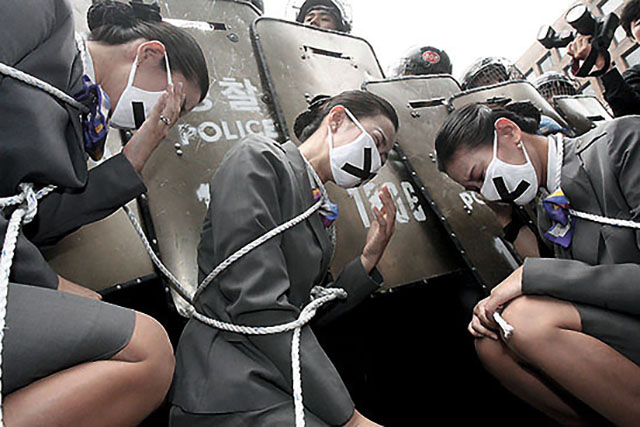
“You can’t get a permanent position for nothing!” This is not a company’s statement. It was a response of a normal university student to the request of female crew members of KTX to change their positions to permanent jobs. This is not the idea of only one student, however, it is a common perception that many young generations share. Today, university students’ in their 20s think ‘When I put a lot of efforts to get a regular job like this, it is unfair for non-regular workers, who did not put same amount of efforts as me, to ask changing their positions into regular workers stubbornly’. This case, which was introduced in the book titled ‘We agree to the discrimination’ published by Chan-Ho Oh, a university lecturer, flatly shows how weak the empathy and the will to coexist of young people are. In the preface, Mr. Oh wrote “Those who are in their 20s who I met at the university consider a cut-throat competition as a good example of life” and “they think discriminating recklessly to take competitive advantage is fair”. Professor No-Ja Park, at Oslo University, Norway, said in his column which was published last fall, “While many young people are drawing a map of Hell-Joseon, they quietly expect that individual efforts would solve the problems” and “They could find out that the social change through solidarity is the only way to survive after continuously confirming the fact that, although large conglomerates make good records in export, the quality of public life would be only degraded, for more years” about the young generations in Korea who cannot band together yet.
However, there is something we need to talk about. We should think about whether young people establish the value by themselves or the society forced them to pursue the value. (See related articles) One young researcher said “The reason why young generations in Korea, China, and Japan live under different values is that the values and environments set by each society are different” and “We should not forget that the youth problem does not mean that the young people have problems”. In other words, it cannot be late to throw a stone at young generations after thoroughly examining the social responsibilities.
Youtube - In a Nutshell – Kurzgesagt
Small but big difference of ‘zero gravity’ and ‘living free’
Of course not all young people pursue the value of extreme competition under the idea of ‘An individual should seek his own way of survival’. There is a few people who helplessly endure the extreme competitions to survive, while try their best efforts to maintain their own pace of life at the same time.
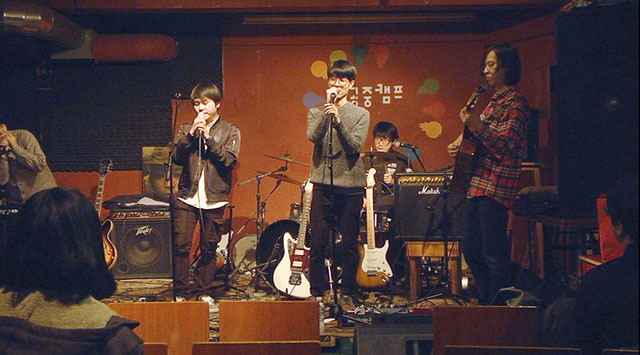 The social enterprise under the name of ‘living free salon’, that was established by indie musicians together, is helping school dropout teenagers in recovering sociality. Chung-Han Lee, the co-representative
of ‘living free salon’, made a diagnosis that “The Korean society is in a state of zero gravity that people cannot rely on anywhere including schools, companies, or home, but, at the same time, it is in a state of over gravity
that the society and system excessively interfere and ask for impractical efforts”. In sum, as a reaction to severe social pressures, the zero gravity society has been created.
Against this back drop, his goal is the society with an appropriate gravity field in which nobody blames those who are living a free life based on personal tempos and values. He said “Actually the difference between NEET, hikikomori
including teenage school dropouts and capable people is very little” and “If the society generate an appropriate gravity filed for them not to be lonely, they can become creative talent”.
Then, how can we create the ‘appropriate gravity field’ he mentioned? Maybe the story of Barber(27, people are called by their nicknames at the living free salon for the equal relationship), who finished the program ‘Arts School
for Employees’(A program for employees who feel loneliness in their busy schedules to enjoy music together) which is run by the living free salon, can be the answer.
The social enterprise under the name of ‘living free salon’, that was established by indie musicians together, is helping school dropout teenagers in recovering sociality. Chung-Han Lee, the co-representative
of ‘living free salon’, made a diagnosis that “The Korean society is in a state of zero gravity that people cannot rely on anywhere including schools, companies, or home, but, at the same time, it is in a state of over gravity
that the society and system excessively interfere and ask for impractical efforts”. In sum, as a reaction to severe social pressures, the zero gravity society has been created.
Against this back drop, his goal is the society with an appropriate gravity field in which nobody blames those who are living a free life based on personal tempos and values. He said “Actually the difference between NEET, hikikomori
including teenage school dropouts and capable people is very little” and “If the society generate an appropriate gravity filed for them not to be lonely, they can become creative talent”.
Then, how can we create the ‘appropriate gravity field’ he mentioned? Maybe the story of Barber(27, people are called by their nicknames at the living free salon for the equal relationship), who finished the program ‘Arts School
for Employees’(A program for employees who feel loneliness in their busy schedules to enjoy music together) which is run by the living free salon, can be the answer.
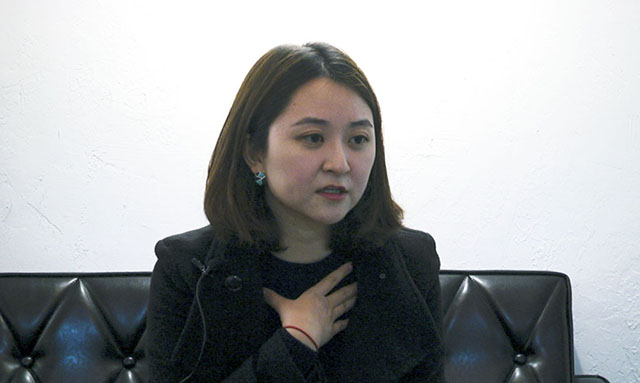 “It is true that I entered the college of education to become an elementary school teacher, but it seemed that my college friends were living only for one goal, the teacher certification examination. I just wanted to do some music
or think of something by following my heart. Whenever I was like that, however, it seemed that my friends thought, looking at me, ‘What are you doing to no purpose?’ Naturally I have been treated as a stranger during my college
year.”
Barber was lonely, thinking there’s no who could understand him. The breakthrough he found when he felt the loneliness in the relationship was to build a new relationship. He tried to find opportunities to meet friends who could
share the common interest, music, and that’s how he started the relationship with the living free salon. He made a band ‘ㅇㅇ’ with friends he met at the living free salon.
“The most important thing for me was to meet somebody who can understand me. Fortunately, I could meet people who gave comfort to me by saying ‘So did I’. As I could be relieved through meetings with them, the relationship with others
became better.”
Countless young people are living a harder life than Barber, the elementary school teacher. Barber said “Since I know how hard their lives would be, it is very cautious to give words of consolation or advice”. However, he wanted
them not to let go the string of relationship. He meant, not the relationship that ties themselves up, but the relationship that is little loose, doesn’t need to be perfect, gives comfort to each other, and exchanges positive energy.
Like Barber, ‘not excessive and very little manpower’ would be good enough for the power to make buoyant young men in the state of zero gravity live freely.
☞Go to the menu
“It is true that I entered the college of education to become an elementary school teacher, but it seemed that my college friends were living only for one goal, the teacher certification examination. I just wanted to do some music
or think of something by following my heart. Whenever I was like that, however, it seemed that my friends thought, looking at me, ‘What are you doing to no purpose?’ Naturally I have been treated as a stranger during my college
year.”
Barber was lonely, thinking there’s no who could understand him. The breakthrough he found when he felt the loneliness in the relationship was to build a new relationship. He tried to find opportunities to meet friends who could
share the common interest, music, and that’s how he started the relationship with the living free salon. He made a band ‘ㅇㅇ’ with friends he met at the living free salon.
“The most important thing for me was to meet somebody who can understand me. Fortunately, I could meet people who gave comfort to me by saying ‘So did I’. As I could be relieved through meetings with them, the relationship with others
became better.”
Countless young people are living a harder life than Barber, the elementary school teacher. Barber said “Since I know how hard their lives would be, it is very cautious to give words of consolation or advice”. However, he wanted
them not to let go the string of relationship. He meant, not the relationship that ties themselves up, but the relationship that is little loose, doesn’t need to be perfect, gives comfort to each other, and exchanges positive energy.
Like Barber, ‘not excessive and very little manpower’ would be good enough for the power to make buoyant young men in the state of zero gravity live freely.
☞Go to the menu
| CREDIT |
Hankookilbo Interactive Team
- Written by
-
KIM, Kyung joon
ultrakj75@hankookilbo.com
- Photos & videos
-
KIM, Jooyoung
will@hankookilbo.com
PARK, Go-eun
rhdms@hankookilbo.com
WON, Min Woo
minwoo087@naver.com
- Design
-
BAEK, Jong-ho
jongho@hankookilbo.com
- Development
-
KIM, Tae Sik
ddasik99@hankookilbo.com
- Translation
-
CHOI, Sung do(Chinese)
KIM, Ha Rim(Japanese)
CHOI, Moon Ui(English)
| Sponsorship |


 KR
KR CH
CH JP
JP